
Press Enter to search

How to List Research Experience on Your Resume
Applying for a role that requires research skills? Here’s how to list your research experience on a resume, with examples you can follow.
3 years ago • 7 min read
Research experience isn’t just for science and academia. Research is a valuable skill that’s required for a number of roles and industries, which means it almost certainly has a place on your resume. And no — that doesn’t mean writing “research” in your skills section and moving on.
Why you should list research experience on your resume
If you’re applying for a job that involves research, listing research experience is a no-brainer. Research-specific positions, scientific jobs like Research Assistants , Lab Assistants or Technicians, graduate school applications, and most jobs in academia all require evidence of research skills. Even outside these positions, research experience demonstrates valuable transferable skills, like critical thinking and attention to detail . Which is not to say that you need to include research experience on every resume — if it makes you a stronger candidate, include it, but if it isn’t relevant and doesn’t add anything else to your candidacy, leave it off.
Research experience resume example
Before we dive right in, here's a sample resume that emphasizes research skills. You can use this as a template or as inspiration to write your own resume from scratch.

Download: PDF | Google Docs
How to list research experience in your resume
Like a lot of desirable skills, research is a soft skill , meaning it’s not something you can claim as an objective fact on your resume without backing it up. What you can do instead is prove it — what previous role involved a lot of research? What resume accomplishments do you have that highlight your research experience? Showing how you used research skills in action is the best way to demonstrate the value you could bring to the company and role you’re applying for.
There are a number of ways you can highlight research experience on your resume:
In a dedicated section
In your work experience, in your education section, listing research publications, in a projects section, in your skills section, in your resume summary.
Let's take a look at each of these options in a little more depth. But first, let's look at an annotated example to help set the context.
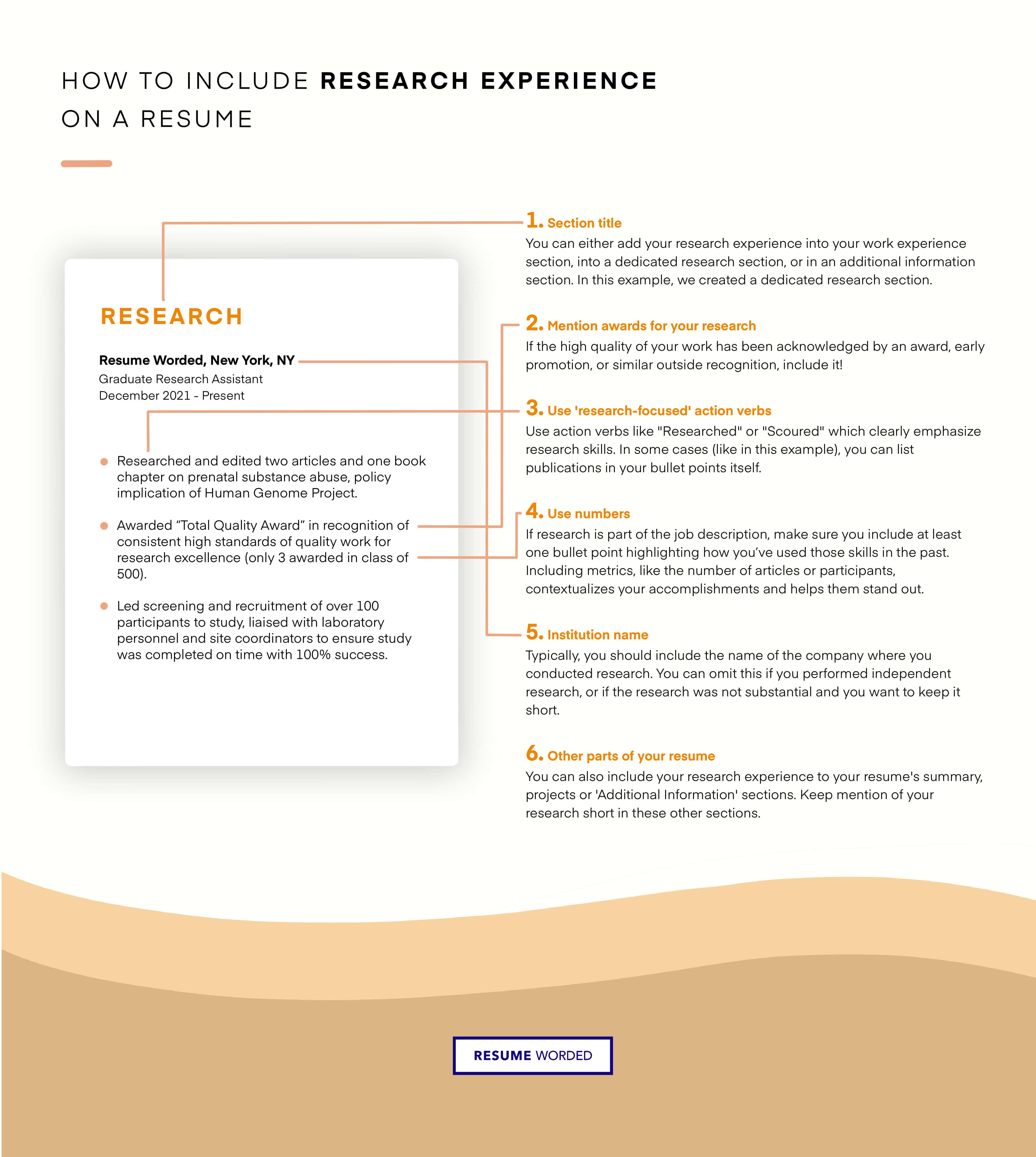
If you come from a research background, you might want to title your work experience ‘Research.’ Alternatively, you could create two experience sections — one titled ‘Work Experience’ and one titled ‘Research Experience’ — if you also have a lot of non-research experience but want to highlight your most relevant experience first. You can go into more detail when applying for a research-focused role by describing the project and specifying the nature of the research and your role in it.
More information: How to title different sections of your resume
Including research experience in your main work experience section is appropriate if it was paid work or if it was your most recent and relevant experience. List the employer — for example, the university or research department — job title, dates, and accomplishments, just like you would any other work experience.
More information: How to list your work experience on your resume
If you’re a current student or recent graduate, you can list your education section at the top of your resume. You can also make this section a little more comprehensive if you don’t have a lot of work experience, by including things like awards, coursework, and academic research.
If you undertook research as part of your studies and it demonstrates skills relevant to the job you’re applying for, list your research accomplishments in bullet points under the education section of your resume.
More information: The must-haves when writing your education on your resume
If you have a lot of publications that came out of your research, and you want to draw attention to them — and if they’re relevant to the job you’re applying for — consider creating a separate publications section . Formal publications like these are an excellent way to add credibility to your research experience.
List each publication in a new bullet point with the title, year, and name of the magazine, website, or journal. Academic publications can be listed more formally if it’s relevant, like if you’re applying for graduate school or a role in academia.
When it comes to listing research on your resume, like other soft skills, you need to show you’ve used this skill in your previous roles by showcasing your research related accomplishments. Upload your resume to the tool below to find out if your resume highlights your most relevant research experience and achievements.
If your research experience is less extensive or wasn’t quite relevant enough to include alongside your work experience or education, you can still highlight it in a projects section. Keep this brief and include 1-2 bullet points showcasing your key research accomplishments.
More information: How to list projects on a resume
Research skills can go in your skills section — as long as they’re hard skills. Steer clear of listing generic skills like “Research” — instead, use our keyword finder to look for relevant skills and keywords and include specific hard skills like data analysis, project management, software proficiency, and certifications.
You can also use the skills search tool below to get a list of hard skills relevant to the research-focused role you’re applying for.
More information: How to write a resume skills section
If you’re applying for a position where research experience is essential, consider emphasizing your experience by including a short resume summary at the top of your resume. This should include the title of the job you’re applying for and a brief overview of your background and key skills.
More information: Generate a summary for your resume
Examples of listing research experience on your resume
No matter where you choose to include it, always list research experience in concise, accomplishment-focused bullet points . These should follow the structure of action verb + what you did + what the result was. Here are some examples of resume bullet points you can use or modify to suit your own research experiences.
Highlight research projects
- Assisted with cell development research projects as part of the Leukemia Research team — identifying cell changes, determining cell counts and coulter counters with 98% accuracy.
If you have significant research experience, describe it! The more relevant it is to the position you’re applying for, the more detail you can go into. Make sure to specify exactly what stages of research you worked on and what your contribution was.
Mention awards for your research
- Awarded “Total Quality Award” in recognition of consistent high standards of quality work for research excellence (only 3 awarded in class of 500).
If the high quality of your work has been acknowledged by an award, early promotion , or similar outside recognition, include it! In addition to the name of the award or accolade, don’t forget to specify context (e.g. 'out of class of 500 people' to increase its credibility.
Demonstrate technical expertise
- Created over 75 3D models with CAD tools such as Solidworks and ANSYS.
If you have experience with specific software or tools that you’ll be using in the position you’re applying for, include a bullet point accomplishment specifying how you’ve used them. While this isn't direct 'research' experience, it uses tools that are relevant to research projects — this is a good way of showing that you have research skill sets without having formal research experience.
Use 'research-focused' action verbs
- Researched and edited two articles and one book chapter on prenatal substance abuse, policy implication of Human Genome Project.
Use action verbs like "Researched" or "Scoured" which clearly emphasize research skills. In some cases (like in this example), you can list publications in your bullet points itself. If you’ve authored academic papers, books, or articles, this is a great way to show the validity and importance of your research.
Include accomplishments related to research studies
- Oversaw screening and recruitment of over 100 participants to study, liaised with laboratory personnel and site coordinators to ensure study is completed on time with 100% success.
Not all research positions involve pure research. Make sure you highlight appropriate related accomplishments, like managing research study participant data and enrolments or managing a team of research assistants.
Include accomplishments relating to research in your field
- Conducted legal research; organized and analyzed data and evidence for over 50 cases annually.
If research is part of the job description, make sure you include at least one bullet point highlighting how you’ve used those skills in the past. Including metrics, like the number of cases you’ve researched, contextualizes your accomplishments and helps them stand out.
- Conducted marketing research for both buy-side and sell-side resulting in 15 strong leads.
Research isn’t just limited to science and academia. Demonstrate your skills in action by the context and end results of your research, like the number of leads it generated or the increase in sales figures.
Spread the word
Hiring manager’s guide: how to list work experience on your resume, you lied on your resume and got the job. what now, keep reading, how to show bilingualism on your resume (with examples), oops what to do if there’s a mistake on your resume, getting the basics right: resume line spacing, subscribe to our newsletter.
Stay updated with Resume Worded by signing up for our newsletter.
🎉 Awesome! Now check your inbox and click the link to confirm your subscription.
Please enter a valid email address
Oops! There was an error sending the email, please try later

Thank you for the checklist! I realized I was making so many mistakes on my resume that I've now fixed. I'm much more confident in my resume now.

Your browser is not supported
Sorry but it looks as if your browser is out of date. To get the best experience using our site we recommend that you upgrade or switch browsers.
Find a solution
- Skip to main content
- Skip to navigation
- Back to parent navigation item
- Career options
- Changing lives
- Fixing the future
- Challenging opinions
- Being the catalyst
- Innovating industry
- Job profiles
- What jobs can I do?
- Employability skills
- What will I earn?
Work experience
- Do I need chemistry to …
- I want to be a teacher
- Teacher training routes in the UK
- Study options
- Options at 14
- Options at 16
- Options for higher education
- Going to university
- Routes into university
- Which degree?
- Which university?
- Student finance
- Earn while you learn
- Which apprenticeship?
- Search and apply
- Preparing for an end-point assessment
- Not a student?
- Information about careers in chemistry
- Supporting and inspiring young people
- Teachers and careers advisers
- Linking curriculum to careers
- Explaining the benefits of a chemistry career
- STEM ambassadors
- Making the difference
- RSC student support

- More navigation items
Where can I get chemistry-related work experience?
It can be hard to get chemistry-related work experience, especially in labs but companies and universities really like students who have the enthusiasm and drive to hunt for a relevant position. Below are some ideas to support your search:
Download our guide to work experience.
Guide to work experience.
- Speak to your careers adviser, chemistry or science teacher about local companies that might offer work experience. Your school may also have a work experience programme. Attending your school careers fairs or employer talks will help you learn about jobs that you might be interested in, or to find out if they offer work experience.
- Look for employers of chemists in your area . Ask if they might have work experience in some of the other business functions within the company. This is a good way to learn more about the uses and applications of chemistry without having to be fully trained to be safe in a laboratory. Contacting general science employers or research institutes, companies on local science parks as well as small and medium enterprises (SMEs) can be useful. SMEs are often more flexible. Be aware that they are more likely to be able to help if you ask them well in advance of when you need to do your placement. You can also follow these companies on social media to find out what they can offer, or ask your family or relatives about how they may be able to help you. T
- Your local hospital is worth approaching for work experience in their research departments, or pathology labs that use a lot of techniques involving chemistry.
- You can also contact your local University’s chemistry department, or schools liaison and outreach team to find out if they can help.
You should keep in mind that it is likely you will not be doing any vital or important tasks during your work experience. Work experience is a great learning experience, and your efforts and interest will not go unnoticed by potential employers and referees for your CV. It is also a good idea to maintain contact with the people you’ve met even after you leave. This can be via email, phone or social media. They may have future job vacancies or be able to help you in some other way.
Whilst the majority of employers will follow employment law, it’s important to be aware of your own rights when it comes to work experience, placements or internships.
The Royal Society of Chemistry does not provide work experience or shadowing opportunities. However, your nearest Royal Society of Chemistry Local Section (of which there are 35 throughout the UK and Republic of Ireland) may be able to offer advice on how to find placements in your area.
Virtual work experience
Below are a few places where you can access virtual work experiences. Also doing a regular internet search for ‘virtual work experience’ will also help discover new schemes as they become established:
- Barclays life skills - learn new workplace skills
- Springpod - apply for virtual work experience and university course taster experiences
- Rate my placement offers a free, flexible programme to upskill individuals in workplace skills and behaviours
- Speakers for schools - free work experience programme
- Forage - runs virtual work experience programmes with big and small companies that mimics entry-level work. Once enrolled, students are given a hypothetical set of tasks that an employee would expect to complete on a given work day teaching students real skills professionals use daily and connects them to the firms themselves.
- Founder4Schools - free interactive webinars so students can still hear from and interact with the business community
Work shadowing
It is sometimes easier to ask for work shadowing opportunities, rather than hands-on work experience. Work shadowing is usually a shorter experience where someone shows you what they do rather than you doing the work. This is still a good opportunity as it allows you to experience the workplace and ask questions about what their day is like, who they work with and why they enjoy their job. Even if a company are not able to offer work experience, you can still ask if you can speak with someone outside of the lab so they can answer your questions.
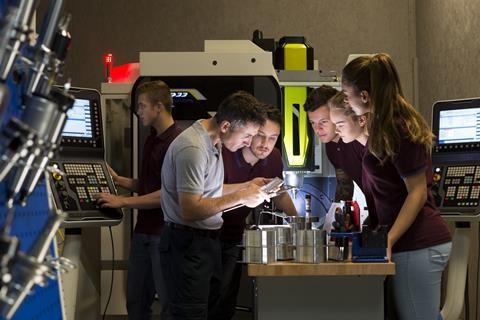
Source: SolStock / E+ / Getty Images
Alternatives
If you aren’t able to find a suitable chemistry-related work experience, placement or shadowing there are alternatives such as volunteering or other science related work that can still provide practical skills and allow you to explore other futures. Consider volunteering at your local science festival or science centre to see what they offer. The British Science Association offer a variety of roles for volunteers as well as one week’s work experience at their offices for low-income individuals. If you’re interested in science communication then volunteering and work experience is very important. The social mobility fund (SMF ) aims to support young people from low-income backgrounds through specific advice, guidance and by arranging paid internships with companies like EDF Energy and Rolls Royce.
Additional links
- Chemistry World Jobs internships board
- Change 100 interships for students and graduates with disabilities or long-term conditions
- UKSpa - list of science parks around the UK
- Try contacting your local Education Business Partnership .
- The Nuffield Foundation offer research placements to over 1,100 students
- The CREST Awards scheme gives students the chance to participate in hands-on science to solve real-life STEM challenges.
- Year in Industry is the UK’s leading student placement experts who offer one year placements before starting university.
- UK Bioindustry Associations - list of organisations in the UK bioindustry
- Step into the NHS or finding work experience in the NHS (teacher and advisor’s guide)
- Bright Green Placements - offers opportunities to students and graduates to work with organisations across Scotland
- Chemagility - worldwide directory of chemical distribution companies
- Help is available from Smart Futures and Careersportal (Republic of Ireland).
- The British Antarctic Survey work experience opportunities
Volunteering
- Do-it (UK-wide)
- Volunteer Scotland
- Volunteering Wales
- Volunteer Now (Northern Ireland)
- Volunteer Ireland (Republic of Ireland)
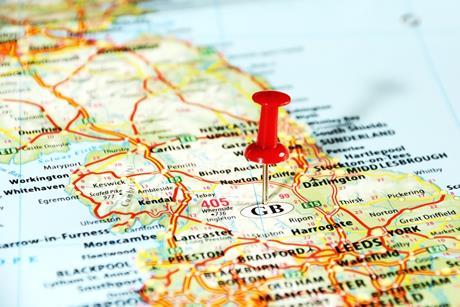
Map of employers
Explore chemical sciences companies who may offer work experience
LATEST JOB PROFILES
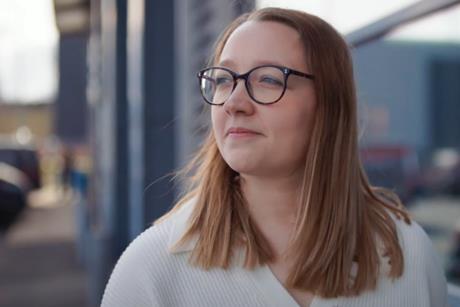
Research scientist, microplastics
Sophie is stopping microplastics going into the environment when you wash your clothes
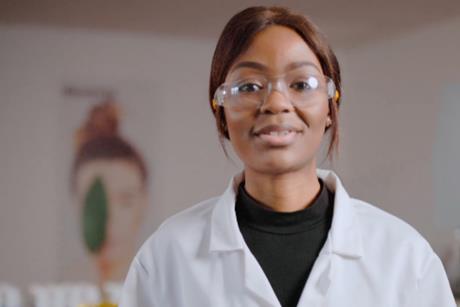
Cosmetics, technical services chemist
Sharlotte makes environmentally friendly beauty products

Quality officer, genomics research
Gary helps scientists make breakthroughs by ensuring the data they use is accurate and reliable.
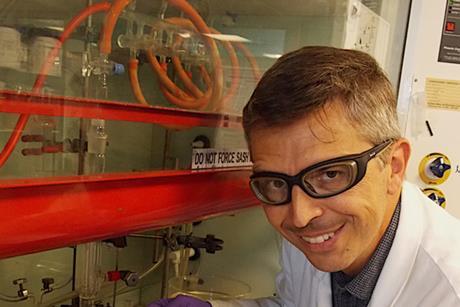
Chief scientist at agritech company, Lambda Energy
Boris’ technology delivers a larger crop of fruits and vegetables while cutting carbon emissions
Browse all job profiles
- Newsletters
Site powered by Webvision Cloud
Employers and Universities: Work with us?
Register | Login
- Apprenticeships
- Career zones
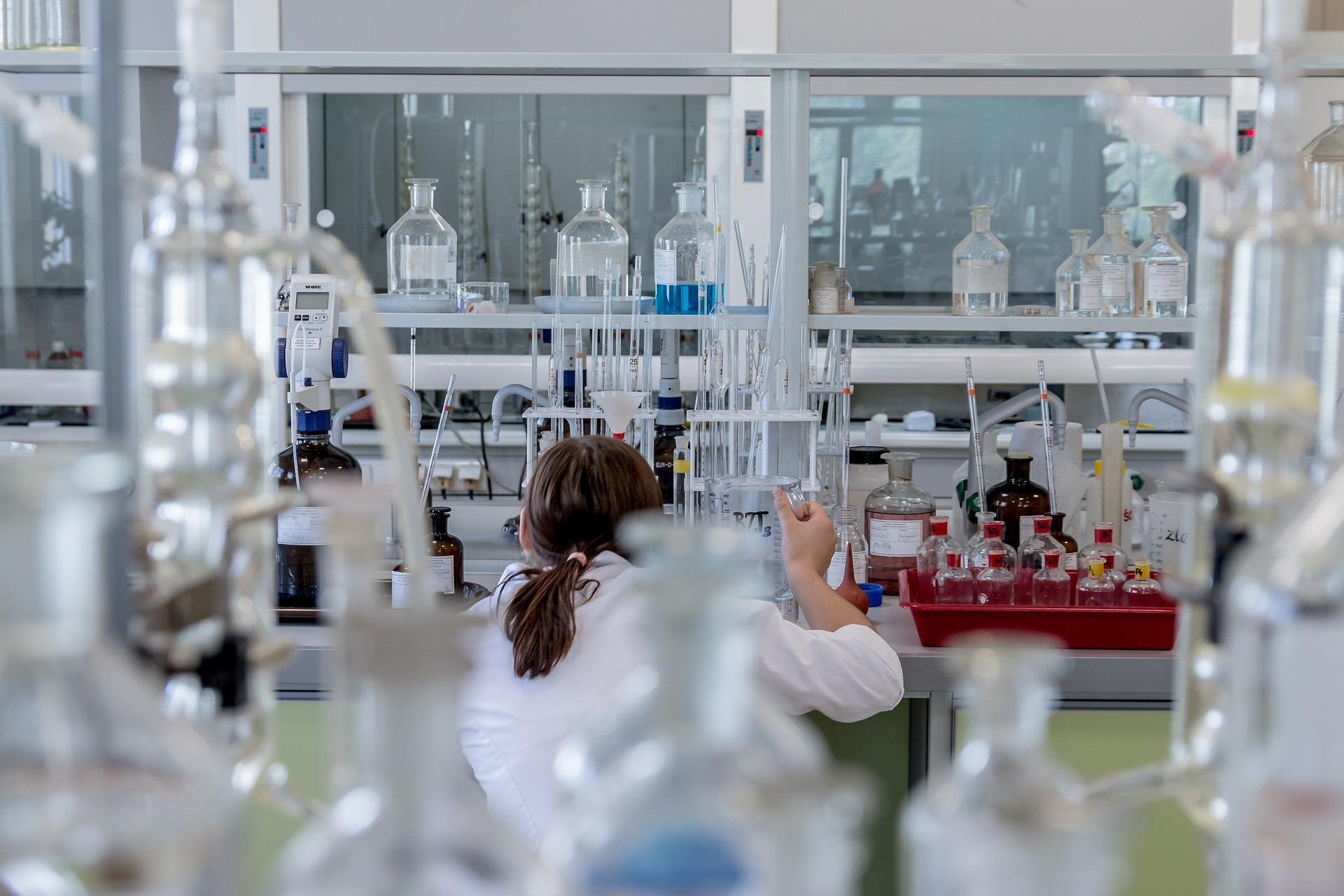
Employers offering science work experience
Whether you’re sure you want to be an astronomer or you’re thinking you might make a brilliant biologist, getting yourself some science work experience is a must.
Work experience lets you see what a real working environment is like. You get to test out your skills in real-life situations. If you think you’d like to pursue a career in science, it’s an excellent way to develop your abilities and makes a strong addition to your CV. And if you’re not sure whether a science job is right for you, doing a science work experience placement is the way to find out. If you then decide you want to follow a totally different career, that’s absolutely fine: the work experience will still be really valuable.
Here we’ll take a look at different kinds of placements, including chemistry work experience and physics work experience, and exactly where you can apply for one.
Read this first: What are science jobs and how can I get one
Where to find... general science work experience
Many schools set aside a week or two during for Year 10 students to complete work experience. Then the summer holidays after Year 12 or Year 13 are a good time to organise your own work experience.
The best approach is to contact local organisations in your area and ask if they might be able to offer you some work experience – plenty will do so even if they’re not offering a formal placement. Start your search at least six months before you want to start your placement. We won’t sugarcoat it: it can be difficult to find lab work experience if you’re in year 10 but if you can get work experience in the office of a science company, this will still be extremely valuable for your CV.
Read more: Why should I study a STEM course?
You could also apply for a Nuffield Research Placement. This organisation gives more than 1,000 students each year the chance to work alongside professional scientists, technologists, engineers and mathematicians. You’re eligible to apply if you’re over 16 and are studying science, technology, engineering of maths course at a school or college in the UK – and most of these placements go to students from low-income households. The placements might focus on data science, engineering or computer science – and you might find yourself in an office, lab or out in the field. Check out these stories to see where previous students have had their placements.
Another option is to contact the British Science Association – they sometimes offer science work experience placements to over 16s. You can also try the Rutherford Appleton Laboratory , which offers a few placements for years 10-13.
Where to find… physics work experience
Start by Googling physics companies – this will include manufacturers, research organisations and pharmaceutical companies. Search and apply as soon as possible; placements are usually competitive.

Don’t forget to also check out the physics departments of universities. University College London, University of Oxford and Sheffield University are among those that offer a range of physics work experience placements for 16-18 year olds. The University of York has placements for Year 12s.
Read: Four famous women in science—and what inspired them in school
The Particle Physics Masterclass Programme gives you a taster of the world of physics through one-day events at universities and labs across the UK. They are aimed at students taking particle physics modules at AS or A-level. Some universities will run days specifically for GCSE students. The events include hands-on workshops, lectures and lab tours. Learn more and apply here .
Where to find… biology work experience
Again your first port of call should be to reach out to organisations in your local area. Consider natural history museums, science museums, wildlife conservation organisations, the biology departments of universities, zoos, laboratories, pharmaceutical companies and vets’ practices. Many placements are not advertised so make sure to be proactive and contact them.
The Met Office offers a week’s work experience in the summer term for students aged between 14 and 18, giving an opportunity to take part in group projects.
GlaxoSmithKline , who make content for websites, offer work experience in labs at three locations across the UK. There are different programmes for A-level and GCSE students, and you’ll get to see what working at GSK and in the pharmaceutical industry is like. Depending on the specific scheme, you might develop your employability skills by taking part in presentations and shadowing GSK staff.
The Wellcome Sanger Institute (a genome science research institute) offers placements for students based in the Cambridge area. You’ll see what the institute does and get an insight into a specific area of research.
Where to find… chemistry work experience
Make a list of manufacturing companies, local science parks, local hospitals and research institutes. Ask if they can offer a science work experience placement or shadowing, ensuring that you give them plenty of notice.
Companies that make food, cosmetic products or even clothing, as well as pharmaceutical companies and chemists like Boots, are a good option for chemistry students, while university chemistry departments may also offer you a placement. Again it can be tricky to get a placement in a lab, but any experience will be useful, and shows future employers your dedication and resourcefulness.
You might also want to explore doing work experience in healthcare. We’ve got a dedicated guide to NHS work experience here .
If you’re struggling to get yourself a placement in a lab or similar environment, a good alternative is to volunteer in a related area. Look out for opportunities at science festivals, and local science museums or centres.
Related posts
How to become a scientist without going to uni
Image credit
Lab scientist by zaozaa09 via Freepik
Latest jobs

Sign up to our newsletter
Get test careers advice and info on apprenticeships and school leaver jobs.

Princeton Correspondents on Undergraduate Research
Tips for Writing about Your Research Experience (Even if You Don’t Think You Have Any)
If you’re someone who hasn’t yet done formal research in a university setting, one of the most intimidating parts of the process can be simply getting your foot in the door. Just like the way your options can seem very limited when applying for your first job, asking for a research position when you have no “experience” can seem discouraging — maybe even to the point of causing you to question whether you should apply in the first place. With that being said, there are some simple tips you can employ when applying for research positions to highlight the link between your existing interests and the work of the position for which you are applying.
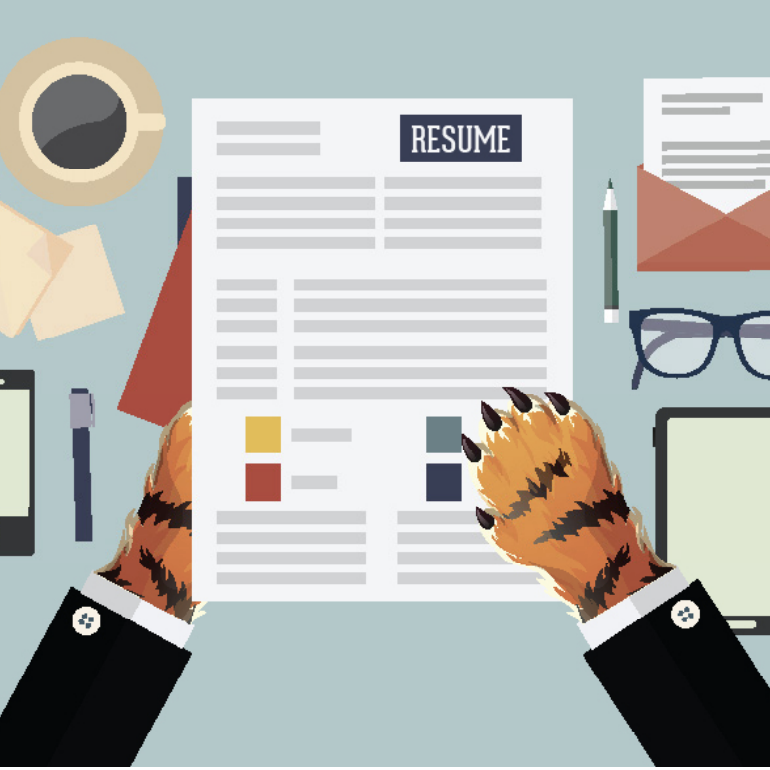
First things first: tailor not just your cover letter (for applications that ask for it) but your resume to the position for which you are applying. Even if you’re just sending a casual email to a professor to ask about the research that they’re doing, as a rule, it never hurts to attach your resume. I also like to think that submitting a resume even without being asked to shows that you’re serious about doing research, and have taken the time to put together a thoughtful inquiry into a position. If you’ve never written a cover letter or resume before, don’t fret. The Center for Career Development has some great online resources to help you create one from scratch. If you are looking for more individualized help, you can also schedule an appointment to get one-on-one feedback on your application at any stage in the writing process.
One of the things that I’ve found, however, is that the single-page format of a resume often isn’t enough space to include all of the information about every single thing you’ve ever done. Rather than trying to jam as many impressive accomplishments as you can onto a page, your goal should be to create a resume that gives a cumulative sense of your interests and experiences as they relate to the position for which you are applying. One of my favorite ways to do this is to create a “Research” section. “But Kate, what if I don’t have any research experience?,” you ask. Remember that paper you wrote about a painting by Monet in your favorite class last semester? Write the title down, or even a sentence or two that summarizes your main argument. The art museum you’re hoping to do research at will love knowing that your interest in their current exhibition on Impressionism is rooted in classes you’ve taken and the projects you’ve done in them, no matter how new you may be to a topic. Your interest in a specific research position has to come from somewhere, and your resume is an important part of demonstrating this to others.
What I would like to reassure you of is that it’s normal to be an undergraduate with very little research experience. The people reading your application —whether it be for an official program or even if it’s just a friendly email with a few questions— know that you are a student and will probably be excited to offer you guidance on how to get involved with more specific research projects even if all you have to offer at this point is enthusiasm for the topic. Working in a lab or with a professor on a research project is an opportunity designed to help you learn above all else, so it’s ok if you don’t know what you’re doing! It goes without saying that having little experience will make the final result of your research experience all the more worthwhile because of the potential to gain knowledge in ways you haven’t even imagined.
— Kate Weseley-Jones, Humanities Correspondent
Share this:
- Share on Tumblr

- Equality, Diversity and Inclusion
- Strategy and Funding
- Influencing Policy
- Research Policies
- Branding and Logos
- Admin Groups
- Campus Connections
- Collaborations
- Sanger Projects
- Publications
- Sanger Seminar Series
- Associate Faculty
- Honorary Faculty
- International Fellows
- Science Staff
- Non-science Staff
- Innovation at the Institute
- For Industry
- For Researchers
- Case Studies
- Our Spin-Outs
- Sanger Technologies
Work Experience

Our Mission
Our mission is clear: to offer inspiring and inclusive work experience opportunities that empower young individuals, particularly those from disadvantaged backgrounds, to explore the exciting world of genomics. We firmly believe that by opening our doors to students, we not only contribute to their personal growth but also contribute to the advancement of scientific understanding in genomics.
We also have a range of careers resources on Your Genome , to help people explore the range of people, roles and careers in genomics.
What We Offer
| Experience what it’s like to work in cutting-edge genomics with one of our Genomics Futures insight days on the Wellcome Genome Campus. Available on a choice of 2 days to students in Year 10 or Year 11, this opportunity will provide valuable insights into careers in genomics. Be inspired as you tour laboratory and data facilities, complete practical activities and learn from professionals about their work. | Next dates TBC. | |
| Gain hands-on experience in the world of genomics with our Genome Academy. Offered to Year 12 students eager to pursue careers in the genomics sector, this three day program provides an immersive learning experience. Through practical activities, workshops, and interactions with professionals, students gain valuable insights into the dynamic field of genomics. | 20 – 22 August 2024 Apply by 21 June 2024. | |
| We proudly support Nuffield Research Placements, hosting two-week experiences for students aged 17. These placements are specially tailored for individuals from low-income backgrounds or those who are the first in their families to attend university. Collaborating with Sanger Institute teams, students engage in short research projects that offer a glimpse into the real-world applications of genomics. | Please enquire with | |
| Partnering with Wellcome Connecting Science and Springpod, we bring you Virtual Work Experience. Designed for students aged 16 and above, this program allows participants to explore various careers in genomics, science, and data without leaving their homes. From laboratory roles to communication and management positions, students get an in-depth understanding of the diverse career options available at the Sanger Institute. | Complete at your own pace, up until the end of September. |
Work experience opportunity
An opportunity for a Year 12 or Year 13 student to join the laboratory team in Dr Carl Anderson’s research group, part of the Human Genetics Programme at the Wellcome Sanger Institute, Wellcome Genome Campus.
Dates: Tuesday 27 – Friday 30 August 2024, apply by 9am on Tuesday 23 July.
Would you like to gain experience in scientific research into human disease? Dr Carl Anderson’s team have a special interest in the genetics of Inflammatory Bowel Disease including Crohn’s Disease and Ulcerative Colitis. Working with human gut biopsies and blood, the team uses single cell sequencing technology to generate data which is analysed to identify the genetic causes of disease, and why some people do not react to treatment.
This will be an immersive opportunity to join both wet- and dry-lab teams. You’ll see and participate (where appropriate) in tissue sample processing, prepare cDNA for sequencing and analyse the quality of DNA samples. You’ll also join the Human Genetics Informatics team to learn about gene structure and public genome databases. You’ll have the opportunity to participate in research discussions and learn about our ongoing nationally-run study, IBD-RESPONSE.
Who is this work experience placement for?
Applications are invited from students in Year 12 and above with an interest in disease and human genetics.
Where is it taking place?
Wellcome Sanger Institute, Wellcome Genome Campus, Hinxton, CB10 1SA
How do I apply?
Applications should be made here: via this form by 9am on Tuesday 23 July.
We have space for one student. The successful applicant will be notified by email.
Why Choose Work Experience at Sanger Institute?
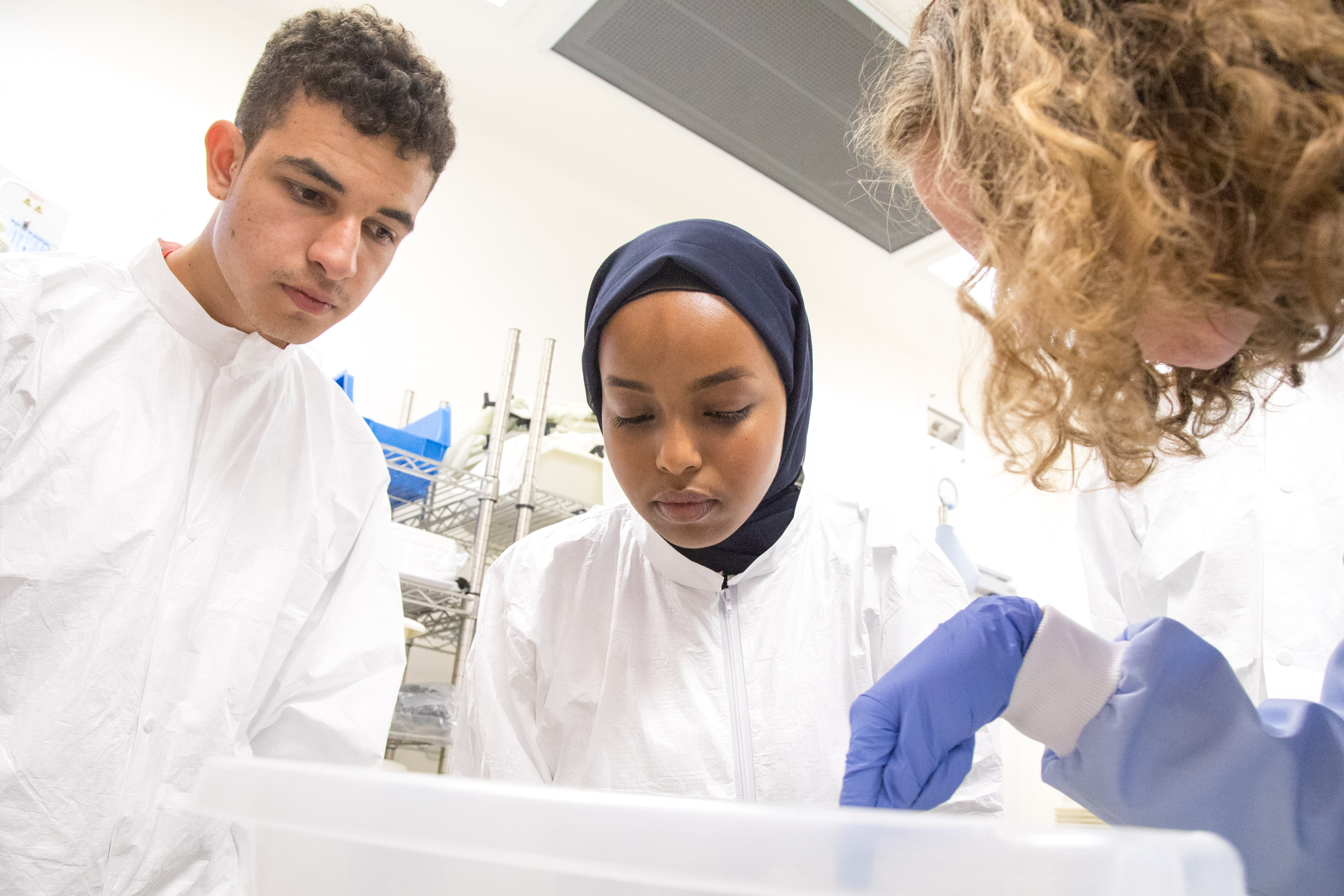
Inclusive Opportunities : We are committed to diversity and inclusivity, striving to provide opportunities for students from all backgrounds to explore genomics.
Hands-On Learning : We offer practical, hands-on experiences that go beyond classroom learning, allowing students to engage with cutting-edge research and technologies.
Expert Guidance : Interact with seasoned professionals and researchers who are passionate about sharing their knowledge and guiding students in their career aspirations.
Inspiring Environment : Immerse yourself in the dynamic and collaborative atmosphere of Sanger Institute, where breakthroughs in genomics are a daily occurrence.
Apply Today
Are you ready to embark on a journey of discovery and learning in the field of genomics? Join us in shaping the future of science and technology. Apply for our various work experience opportunities today and take your first step towards a career in genomics.
Note: Our programs have specific eligibility criteria. Please refer to the individual program links for more information on how to apply and whether you qualify for participation.
Enquire now
Please keep an eye on this page as we will have more opportunities coming up in 2024.
For any enquiries or further information, please contact us at [email protected] . We look forward to helping you take your first steps into the world of genomics!
For more placement options please sign up to our mailing list: [email protected]

Connecting Science
Connect with the diverse range of communities, learners, educators and researchers, creating opportunities and spaces to explore genomic science and its impact on people. ...more
- Research Scientist Resume Example
Resume Examples
- Common Tasks & Responsibilities
- Top Hard & Soft Skills
- Action Verbs & Keywords
- Resume FAQs
- Similar Resumes
Common Responsibilities Listed on Research Scientist Resumes:
- Conducting scientific research and experiments to explore new theories, concepts, and technologies.
- Designing and implementing research projects, including developing research protocols and methodologies.
- Collecting and analyzing data using various scientific techniques and tools.
- Interpreting and evaluating research findings to draw conclusions and make recommendations.
- Collaborating with other scientists and researchers to exchange ideas, share knowledge, and enhance research outcomes.
- Writing research proposals, grant applications, and scientific papers for publication in academic journals.
- Presenting research findings at conferences, seminars, and other scientific forums.
- Keeping up-to-date with the latest advancements and trends in the field of research.
- Mentoring and supervising junior researchers and laboratory staff.
- Managing research budgets, resources, and equipment.
- Collaborating with industry partners and stakeholders to apply research findings in practical settings.
- Participating in interdisciplinary research projects and teams to address complex scientific challenges.
Speed up your writing process with the AI-Powered Resume Builder . Generate tailored achievements in seconds for every role you apply to. Try it for free.
Research Scientist Resume Example:
- Designed and executed a series of experiments to investigate the efficacy of a novel drug candidate, resulting in a 30% improvement in treatment outcomes compared to current standard therapies.
- Collaborated with a team of researchers to develop a groundbreaking research protocol for studying the genetic basis of a complex disease, leading to the identification of three novel genetic markers associated with disease susceptibility.
- Published research findings in a prestigious scientific journal, receiving recognition from the scientific community and contributing to the advancement of knowledge in the field.
- Managed a research project focused on developing a new diagnostic tool for early detection of cancer, achieving a 95% accuracy rate in identifying cancerous cells and significantly reducing false positive results.
- Collaborated with industry partners to translate research findings into practical applications, resulting in the development of a prototype device that has the potential to revolutionize cancer screening methods.
- Presented research findings at international conferences, receiving accolades for the innovative approach and potential impact on improving patient outcomes.
- Developed and implemented a novel research methodology for studying the effects of environmental factors on plant growth, leading to the discovery of a new plant species with enhanced drought tolerance and potential applications in agriculture.
- Mentored and supervised a team of junior researchers, guiding them in conducting experiments and analyzing data, resulting in the successful completion of multiple research projects and the publication of several scientific papers.
- Obtained research funding through successful grant applications, securing $500,000 in funding for a project focused on developing sustainable solutions for water conservation in arid regions.
- Experimental design and execution
- Data analysis and interpretation
- Scientific writing and publishing
- Project management
- Team collaboration and leadership
- Grant writing and funding acquisition
- Knowledge of molecular biology and genetics
- Proficiency in using research and diagnostic tools
- Presentation and communication skills
- Ability to translate research findings into practical applications
- Mentoring and supervising junior researchers
- Knowledge of statistical analysis software
- Understanding of ethical research practices
- Problem-solving and critical thinking
- Ability to work in a multidisciplinary environment
- Proficiency in using laboratory equipment
- Knowledge of current scientific literature and trends
- Ability to handle and interpret large datasets
- Proficiency in bioinformatics tools and software
- Understanding of drug development processes.
Top Skills & Keywords for Research Scientist Resumes:
Hard skills.
- Experimental Design
- Statistical Analysis
- Data Collection and Management
- Hypothesis Testing
- Data Visualization
- Programming (e.g., Python, R)
- Machine Learning
- Scientific Writing
- Literature Review
- Research Ethics
- Laboratory Techniques
- Data Interpretation
Soft Skills
- Analytical Thinking and Problem Solving
- Attention to Detail and Accuracy
- Creativity and Innovation
- Critical Thinking and Logical Reasoning
- Data Analysis and Interpretation
- Experimental Design and Methodology
- Intellectual Curiosity and Continuous Learning
- Scientific Writing and Communication
- Teamwork and Collaboration
- Time Management and Organization
- Technical and Research Skills
- Adaptability and Flexibility
Resume Action Verbs for Research Scientists:
- Implemented
- Collaborated
- Investigated
- Synthesized
- Experimented
Build a Research Scientist Resume with AI

Resume FAQs for Research Scientists:
How long should i make my research scientist resume, what is the best way to format a research scientist resume, which keywords are important to highlight in a research scientist resume, how should i write my resume if i have no experience as a research scientist, compare your research scientist resume to a job description:.
- Identify opportunities to further tailor your resume to the Research Scientist job
- Improve your keyword usage to align your experience and skills with the position
- Uncover and address potential gaps in your resume that may be important to the hiring manager
Complete the steps below to generate your free resume analysis.
Related Resumes for Research Scientists:
Research assistant, research analyst, research associate, research coordinator, research manager, research intern, research technician, data scientist.
- You are here:
- American Chemical Society
Get Experience
Get experience to become.
Search and apply for the latest opportunities including research experience, internships, co-ops and fellowships.
Popular Searches:
Internships Co-ops REU Postdoctoral Experiences Fellowships Browse All Opportunities
Internships
Internships are short-term positions that offer practical, professional learning experiences in a field of interest. You can apply classroom knowledge to a real-world work environment and build new skills that can lead to a full-time position.

Student Challenge "Your Step into Solvation Science"
Cluster of Excellence RESOLV – Ruhr Explores Solvation
Date posted: Aug 20, 2024

Solvation Scholars Undergraduate Exchange
Date posted: Aug 19, 2024

Internships and Co-ops
Date posted: Apr 23, 2024
Research Experience for Undergrads (REU)
Research Experiences for Undergraduates (REU) are programs that give students the opportunity to actively participate in research funded by the National Science Foundation at host institution. Students work closely with researchers and faculty on a research project to gain new knowledge and build skills.

Injury Science REU
Children’s Hospital of Philadelphia
Philadelphia, Pennsylvania
Date posted: Apr 30, 2024
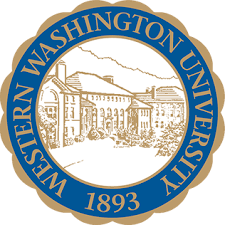
Western Washington Summer 2024 REU
Western Washington University
Bellingham, Washington
Date posted: Feb 14, 2024
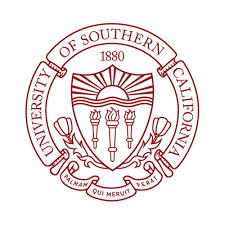
Snapshots of Chemistry: Visualization at the Molecular Level
University of Southern California
Los Angeles, California
Cooperative Education (Co-op)
Cooperative education opportunities (Co-ops) allow students to work full-time in a field related to their major for an extended period during the traditional school year. Students join a working team within the sponsoring organization. Co-op positions are typically paid.
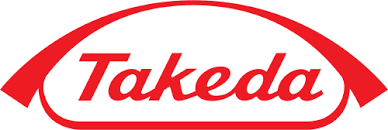
Student Internships
Deerfield, Illinois
Date posted: Apr 2, 2024

Linde Gas & Equipment (LG&E) LEAD Program
Danbury, Connecticut
Fellowships
Fellowships are funded, short-term opportunities focused on professional, academic, and/or personal development. Fellowships can last from a few weeks to a few years and are sponsored by a professional association, organization, institution, or government agency which sets the eligibility requirements.

Gilbreth Postdoctoral Fellowships at Purdue Engineering
Purdue University
West Lafayette, Indiana
Postdoctoral
Date posted: Jul 23, 2024
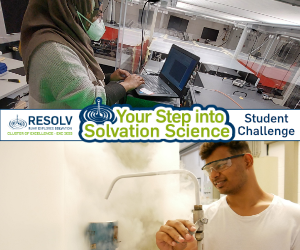
Resolv, RUHR-UNIVERSITÄT BOCHUM
Date posted: Mar 1, 2024
Postdoctoral Experiences
A postdoctoral experience helps individuals who have received a doctoral degree (or equivalent) to engage temporarily in mentored, advanced training for a defined period to enhance professional skills and research independence needed to pursue a chosen career path. Postdoctoral opportunities exist at universities, industry companies, government agencies, and non-profit organizations.

Postdoctoral Associate
University of Pittsburgh
Pittsburgh, Pennsylvania
Date posted: Aug 29, 2024

Postdoctoral Research Fellow—Qi Lab
Boston, Massachusetts
Date posted: Aug 6, 2024

Postdoctoral Research Fellow—Surgery
Dana Farber Cancer Institute
Get alerts in your inbox
Sign up to receive the latest Internships, REUs, Co-ops, Fellowships and more.
Your information has been successfully submitted!
ChemIDP.org
Build the perfect resume.
ChemIDP tracks user progress and input, providing tips and strategies to complete goals and guide career exploration.
ACS Institute
Browse learning opportunities.
Learn how each area of training prepares you for a career in the chemical sciences.
Careers & the Chemical Sciences
Explore chemistry fields.
Explore over 40 fields in the chemical sciences and learn what chemists do in different roles.
C&EN Jobs
Find your first job through the c&en job board..
Chemical & Engineering News is a weekly news magazine published by the American Chemical Society.
Accept & Close The ACS takes your privacy seriously as it relates to cookies. We use cookies to remember users, better understand ways to serve them, improve our value proposition, and optimize their experience. Learn more about managing your cookies at Cookies Policy .
- Terms of Use
- Accessibility
Copyright © 2024 American Chemical Society

UCL Great Ormond Street Institute of Child Health
Great Ormond Street Institute of Child Health
- Work Experience for School Pupils 16-18

Work Experience for School Pupils aged 16-18 years
The GOS ICH Work Experience programme is jointly hosted by the Institute's 5 Teaching & Research Departments . Each Department contributes 2 or 3 sessions to the timetable, providing students with the opportunity to learn about a wide range of research topics and techniques. Our aim is to give students an understanding of the variety of career opportunities in research science.
Activities range from talks and interactive sessions in the lab with researchers and PhD students to attending Departmental seminars or taking part in a Journal Club. We organise several hands-on sessions such as looking at cells under a microscope and pipetting solutions. As we work closely with Great Ormond Street Hospital, sessions may also include visits to clinical labs in the hospital but will not include visits to hospital wards or other clinical settings.
Students interested in pursuing a medical career and looking for a clinical placement should visit the Great Ormond Street Hospital Work Experience webpage and the University College London Hospitals Work Experience webpage .
We offer 12 placements at a time and students are expected to attend the entire week. Attendance is free and we provide visiting students with lunch each day. You will, however, need to pay your travel costs to and from the UCL GOS Institute of Child of Health.
The next Work Experience Week is on 28th October - 1st November 2024
How to apply.
Eligibility:
You must be
- 16 or over, having just completed your GSCEs or studying for your A-Levels
- Able to attend the whole work experience week
We particularly encourage those from disadvantaged backgrounds to apply. Please note this is not a clinical placement. Preference will be given to those who express an interest in a science placement.
Application Process
- Applications are now closed.
- Applications will be shortlisted and placements offered to students by mid-September.
- Students placed on the waiting list will be notified by the end of September.
- Students must confirm their attendance for the full week. Any free places will be offered to students on the Waiting List.
- We are unable to reply to all applicants as we are usually oversubscribed. If you do not hear from us by the end of September, your application was unsuccessful.
- Programme of events to be circulated to students before the placement starts.
Feedback from previous students:

“Loved seeing all the different routes into a science career!"
"I just wanted to say thank you so much for the work experience opportunity I was given. I really enjoyed the week and found visiting all the different labs very interesting and eye-opening. I'm also grateful for all of the people involved who gave up their time to show us some of their work." “Thank you so much for organising this brilliant and informative week! I enjoyed every minute of it and feel lucky to have gained so much knowledge and experience. I came into this unsure of what degree I wanted to take or what path I wanted to follow, ... and it has helped to confirm my realisation that I would like to do a Biological Sciences undergraduate course.” “Thank you so much for organising this work experience, I've found it incredibly enjoyable and informative in helping me decide what career I may like to do in the future. Also, thank you to all the speakers who took the time to give presentations, prepare PowerPoints and answer all our questions. It's been a great experience.”
Have Questions?
Contact the GOS ICH Work Experience team at [email protected]
The GOS ICH Christmas Lectures:
YouTube Widget Placeholder https://www.youtube.com/watch?v=WdnEmB_tQY4
GOS ICH Undergraduate Summer Studentships
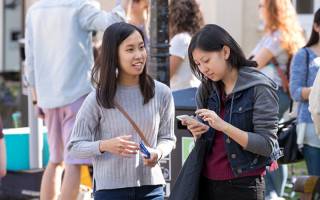
The Child Health Research Studentship Scheme offers up to 7 bursaries for undergraduate students studying science or medicine to carry out a research project over the summer.
In2scienceUK - Promoting Social Mobility and Diversity in STEM:
YouTube Widget Placeholder https://youtu.be/Bf9ytF3ssRs
Clinical/Medical Placements
For students interested in pursuing a medical career: Great Ormond Street Hospital
University College London Hospitals
Internships
We offer several types of internships across our science departments, either based at kew in london or wakehurst in sussex..

Our departments
We have three main departments: Research, Partnerships and Operations.

Projects and programmes
We partner with over 100 countries to identify, document, research and conserve the world's plants and fungi.
- Twitter page Twitter
Please enable JavaScript in your web browser to get the best experience.
We use cookies to track usage and preferences.
Primary navigation
- PhD students
- Exhibitions
- Translation
- Work experience
Work experience students
Any questions.
Send a message to [email protected].

Introduction
Meet our work experience students.
Sixth form students Tarik and Malina took part in work experience placements discovering DNA sequencing and science communication.
Hear how they got on
Our work experience programme highlights the variety of careers available, from world-leading laboratory research to the supporting business services.
Placements might be in research laboratories in areas such as cell biology, genetics, immunology and bioinformatics. Work experience could be also in non-laboratory locations such as the IT, reception services, public engagement and education teams.
During placements, students are involved in a range of activities supervised by one of our staff.
Available placements Placement details Eligibility checker
Available placements
Placement details, placement length.
Most placements last for one week, although some can be up to four weeks long or occasionally take place for one day a week over the summer holidays. If selected for work experience, you will be expected to attend all days of the placement.
Placement availability
Placements are available throughout the year. Some coincide with specific weeks that local schools have timetabled for work experience. They are also available during school half term breaks, Easter and summer holidays.
Food and travel expenses
We can contribute to students' travel expenses during the placement (up to a maximum of £50 per week) and food (up to £5 per day to be spent in the Crick’s restaurant).
Eligibility checker
Placements are available for state school students who are 14-19 years old.
For health and safety reasons, only students aged 16 or older at the start of the placement can apply for research laboratory-based placements. This restriction may also apply to some non-laboratory placements.
We encourage students to apply for as many placements as they're interested in. However, if a student is offered more than one placement, they may only attend one placement at the Crick per academic year.

✓ You are eligible for work experience at the Crick.
Available placements are listed above .
Placements at the Crick are either lab-based or not lab-based. Please be aware that you must be 16-19 at the start of the placement to be able to apply for a lab-based placement.
Note that to apply for a lab placement at the Crick you must be 16-19.
✕ Unfortunately you're not eligible for a work experience placement at the Francis Crick Institute.
However, given your interest, you may like to check out the opportunities below:
- The Nuffield Foundation's placements
- Summer schools at Imperial College
- Social Mobility Foundation's placements
Share the page
- Share on Twitter
- Share on Facebook
- Share on LinkedIn
- Share on Email
The Francis Crick Institute is a unique partnership between


Study at Cambridge
About the university, research at cambridge.
- Undergraduate courses
- Events and open days
- Fees and finance
- Postgraduate courses
- How to apply
- Postgraduate events
- Fees and funding
- International students
- Continuing education
- Executive and professional education
- Courses in education
- How the University and Colleges work
- Term dates and calendars
- Visiting the University
- Annual reports
- Equality and diversity
- A global university
- Public engagement
- Give to Cambridge
- For Cambridge students
- For our researchers
- Business and enterprise
- Colleges & departments
- Email & phone search
- Museums & collections

- Cambridge Stem Cell Institute
- About us overview
- CSCI Annual Report - 2023
- Our building overview
- How to find us
- Art at JCBC overview
- Anna Brownsted
- Victoria Morton
- Harold Offeh
- Kelly Briggs
- Public engagement overview
- Reaching beyond Cambridge
- Connecting with local communities
- Giving patients a voice
- Creating an open and engaged research culture
- Under the Microscope
- What would you become?
- You, Me and Us
- Equity, diversity & wellbeing
- For current students
- People overview
- Leadership & governance overview
- Postgraduate Education Committee
- Professional services
- Principal investigators overview
- Dr Maria Alcolea
- Professor Roger Barker
- Dr Thorsten Boroviak
- Dr Harry Bulstrode
- Dr Maria Duque-Correa
- Professor Cédric Ghevaert
- Professor Bertie Göttgens
- Professor Tony Green
- Dr Brian Hendrich
- Dr Daniel Hodson
- Professor Brian Huntly
- Professor Thóra Káradóttir
- Professor Walid Khaled
- Professor Elisa Laurenti
- Professor Andrew McCaskie
- Professor Simón Méndez-Ferrer
- Dr Jyoti Nangalia
- Professor Anna Philpott
- Professor David Rowitch
- Dr Fotios Sampaziotis
- Professor Ben Simons
- Professor Sanjay Sinha
- Dr Mekayla Storer
- Professor Sarah Teichmann
- Dr Richard Tyser
- Dr Konstantinos Tzelepis
- Professor George Vassiliou
- Professor Matthias Zilbauer
- Affiliated principal investigators overview
- Dr Irving Aye
- Dr Srinjan Basu
- Dr Sumru Bayin
- Professor Serena Best
- Professor Allan Bradley
- Professor Sarah Bray
- Professor Ruth Cameron
- Dr Peter Campbell
- Dr Maria Christophorou
- Professor Anne Ferguson-Smith
- Professor Sarah Franklin
- Professor Kristian Franze
- Professor Richard Gilbertson
- Dr Namshik Han
- Professor Muzlifah Haniffa
- Dr Phil Jones
- Dr Golnar Kolahgar
- Dr Mark Kotter
- Dr András Lakatos
- Professor Madeline Lancaster
- Professor Ernest Laue
- Dr Joo-Hyeon Lee
- Professor Paul Lehner
- Dr Mo Lotfollahi
- Dr Florian Merkle
- Professor James Nathan
- Professor Kathy Niakan
- Professor Ewa Paluch
- Dr Manav Pathania
- Dr Emma Rawlins
- Dr Teresa Rayon
- Dr Peter Rugg-Gunn
- Dr Marta Shahbazi
- Professor Azim Surani
- Dr Martin Turner
- Dr Jelle van den Ameele
- Professor Alan Warren
- Professor Doug Winton
- Dr Evgeny Zatulovskiy
- Academic & research staff
- Research overview
- Discovery Research Platform for Tissue Scale Biology
- SCI-TIF - Technology & Innovation Forum
- Stem cell states
- Stem cells in disease
- Stem cells & therapeutics
- Our COVID-19 research
- Clinical trials
- Interdisciplinary Research Centre overview
- Cambridge Centre for Myelin Repair overview
- CCMR PI and Affiliates
- Research culture and integrity overview
- Open access & Plan S
- Guidelines and Policies
- Core facilities overview
- Bioinformatics
- Electron microscopy
- Genomics overview
- Submission guidelines
- Flow cytometry
- Single cell platforms
- Tissue culture
- Events overview
- International Seminars overview
- Group Leader Seminars overview
- PhD and Postdoc Seminars overview
- Research Culture & Integrity Seminars overview
- Past Events
- Haematology Event: Cambridge Lymphoma Biology International Symposium
- Christmas Market at JCBC & CRUK
- Learn more overview
- Patient information
- Join us overview
- Students overview
- MPhil in Stem Cell Medicine (taught course)
- PhD in Biological Science (Stem Cell Biology) overview
- PhD Projects
- MPhil in Biological Science (Stem Cell Biology) overview
- MPhil Projects
- Wellcome-funded Four Year (MRes + PhD) Programme in Stem Cell Biology & Medicine overview
- Students: Past & Present
- 1+3 Stem Cell Programme Statistics
- FAQs for Wellcome studentships
- Other funding opportunities
- Work experience & internships
- Equality, diversity & wellbeing (students)
- Institute Only overview
- PhD in Biological Science (Stem Cell Biology)
- MPhil in Biological Science (Stem Cell Biology)
- Wellcome-funded Four Year (MRes + PhD) Programme in Stem Cell Biology & Medicine
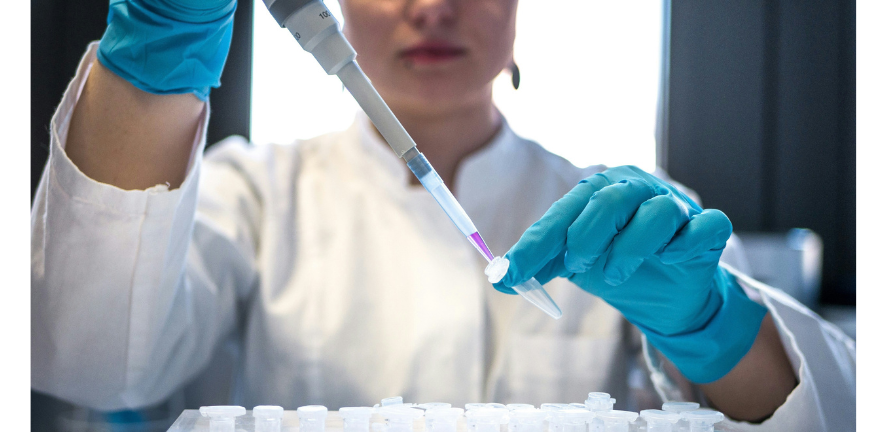
Work experience and summer placements
Work experience 2023-2024.
All applications for work experience have now been filled for Spring and Summer 2024. Applicants may apply from October 2024 onwards.
CSCI is committed to taking on work experience students, year 10 and above , to participate in a period of work experience.
Students will have the opportunity to experience ‘live science’ within the Cambridge Stem Cell Institute, a world-leading centre for stem cell research. The work experience placements will take place in our Principal Investigator’s labs, observing laboratory skills and techniques carried out by our research scientists.
Application process
Applicants should send a short covering letter (one side of A4 max), outlining why you wish to undertake work experience with us and what areas of science you are particularly interested in and why ( and/or specify a particular Principal Investigator of interest). Please also include a brief CV with your application and the dates that you would like to be considered for work experience. Applications are considered on a rolling basis and it may not be possible to offer work experience placements for all applicants.
Please note that we can only host students in Year 10 (aged 14/15) and above ( excluding accelerated students ).
Please send all informal queries and/or applications to [email protected] . We will let you know as soon as possible of the outcome.
Nuffield placements
Nuffield Research Placements give students the opportunity to work alongside professional scientists, technologists, engineers and mathematicians for 4-6 weeks over the summer holidays.
To find out more and to see if you meet the eligibility criteria, visit the Research Placements and Experiences website .
In2scienceUK programme
The In2scienceUK programme helps disadvantaged and under-represented 16-17 year olds (studying at least one STEM subject, either at sixth form or at college) gain an insight into science, technology, engineering or maths. The programme seeks supervisors to host these students for 2-week placements in the summer, and h osts can be anyone from PhD students, to Postdocs, to PIs.
See here for more information.
Internships
Internships are fixed-term periods of paid work experience, typically lasting 1-3 months.
You may want to check out the University of Cambridge School of Biological Sciences which run their internship programme Experience Postgrad Life Sciences every year for undergraduates.
As a widening participation initiative, ‘ Experience Postgrad Life Sciences programme’, offers 8-week Summer research placements to second year UK and Republic of Ireland undergraduate students, with priority given to those from underrepresented and disadvantaged groups.
External and existing University of Cambridge students are welcome to apply for internships within the University. To apply for an internship vacancy that you've seen advertised, please visit here for more information.
Please note: Applicants must apply to a specific vacancy - we cannot accept CVs from speculative applicants.
Erasmus+ is the European Union’s (EU) funding programme for education and training, youth and sport.
The University of Cambridge has participated in the Erasmus programme since its inception 25 years ago and in the last few years there has been a substantial increase in student mobility.
Students from institutions with whom we have an Erasmus inter-institutional agreement can come at all levels; undergraduate, Masters and PhD and for one, two or three terms. Applicants must achieve the same entry requirements as students applying for a full degree, this includes an English language requirement.
For more information about the Erasmus Programme, please visit Erasmus+ .
Outreach projects - students under 16
Network for East Anglian Collaborative Outreach (neaco)
The Network for East Anglian Collaborative Outreach (neaco) delivers activities across East Anglia to help students in Years 9-13, with little or no experience of university, to explore the world of higher education.
Find out more here .
Insight Discover
Insight Discover is a programme that students follow from Year 7 to Year 8, which aims to develop key academic skills to support them in their academic work. In addition, the programme introduces students to university and the options which are available to them in the future.
Insight Discover is a collaborative programme with The Brilliant Club (see also below) and in the final part of Insight Discover our participants take part in the Brilliant Club’s Scholars Programme .
Insight Explore
Insight Explore is an academic programme for Year 9 students which aims to develop participants interests and tackle the barriers many students face when applying to university.
Find out more here.
The Realise project's aim is to encourage more young people in care to consider higher education. The University of Cambridge runs a large number of events ranging from science days to theatre days to give a taste of life as a student at Cambridge.

Outreach projects – students 16+
HE+ is a collaboration between the University of Cambridge's Admissions Office and Colleges, and state schools/colleges across the UK. The University and schools in 20 regions collaborate to form regional consortia to support highly-able students from under-represented areas and backgrounds, and involves approximately 4,000 students in Year 12 each year.
Find out more here .
Insight + aims to support students making competitive applications to selective Higher Education Institutions by supporting students over 12 months from Easter in Year 12. Students receive additional subject specific teaching across five subject strands (English, Physics, Maths, Chemistry and History) which is delivered by experience teachers and departmental outreach practitioners.
Sutton Trust Summer Schools
Sutton Trust Summer Schools are free subject-specific residential courses for Year 12 students studying at state-maintained schools in the UK. The five-day summer schools in July and August allow students to explore their interest in one of 26 subjects and gain an insight into what it is like to live and study as a first-year undergraduate student at Cambridge.
Find out more here .
Opportunities for current postgraduate students to get involved with schools or training
If you have a great idea for engagement with community or patient groups, get in touch with the Institute Public Engagement team to discuss support and approaches: [email protected]
The Brilliant Club
Are you a PhD researcher or doctoral graduate who wants to help a young person realise their academic potential?
The Brilliant Club’s 'Researcher Development Programme' offers PhD and Early Career Researchers a meaningful, professionally developmental, paid tutoring opportunity. Training with The Brilliant Club and working as a Scholars Programme tutor enables researchers to communicate their research to a non-specialist audience, gain valuable teaching and public engagement experience and deepen their knowledge of the UK education system.
Tutors will be supported to complete a series of training modules before beginning work with us, and further continuous professional development for each subsequent placement.
Get in touch
For information about work experience , contact [email protected]
For information on internships , contact [email protected]
For information on longer term student placements , contact [email protected]
Other resources
The University of Cambridge Gurdon Institute runs an Aspiring Scientist Training Programme every year over the Summer. A few of their Group Leaders are affiliated with the Cambridge Stem Cell Institute.
More information about taking part in work experience at the University of Cambridge can be found here .
Jeffrey Cheah Biomedical Centre Puddicombe Way Cambridge Biomedical Campus CB2 0AW
Social media
Quick links
Logo and brand guidelines
Data protection policies
Site privacy and cookie policies
Our funders
Medical Research Council
© 2024 University of Cambridge
- Contact the University
- Accessibility
- Freedom of information
- Privacy policy and cookies
- Statement on Modern Slavery
- Terms and conditions
- University A-Z
- Undergraduate
- Postgraduate
- Research news
- About research at Cambridge
- Spotlight on...
Work experience
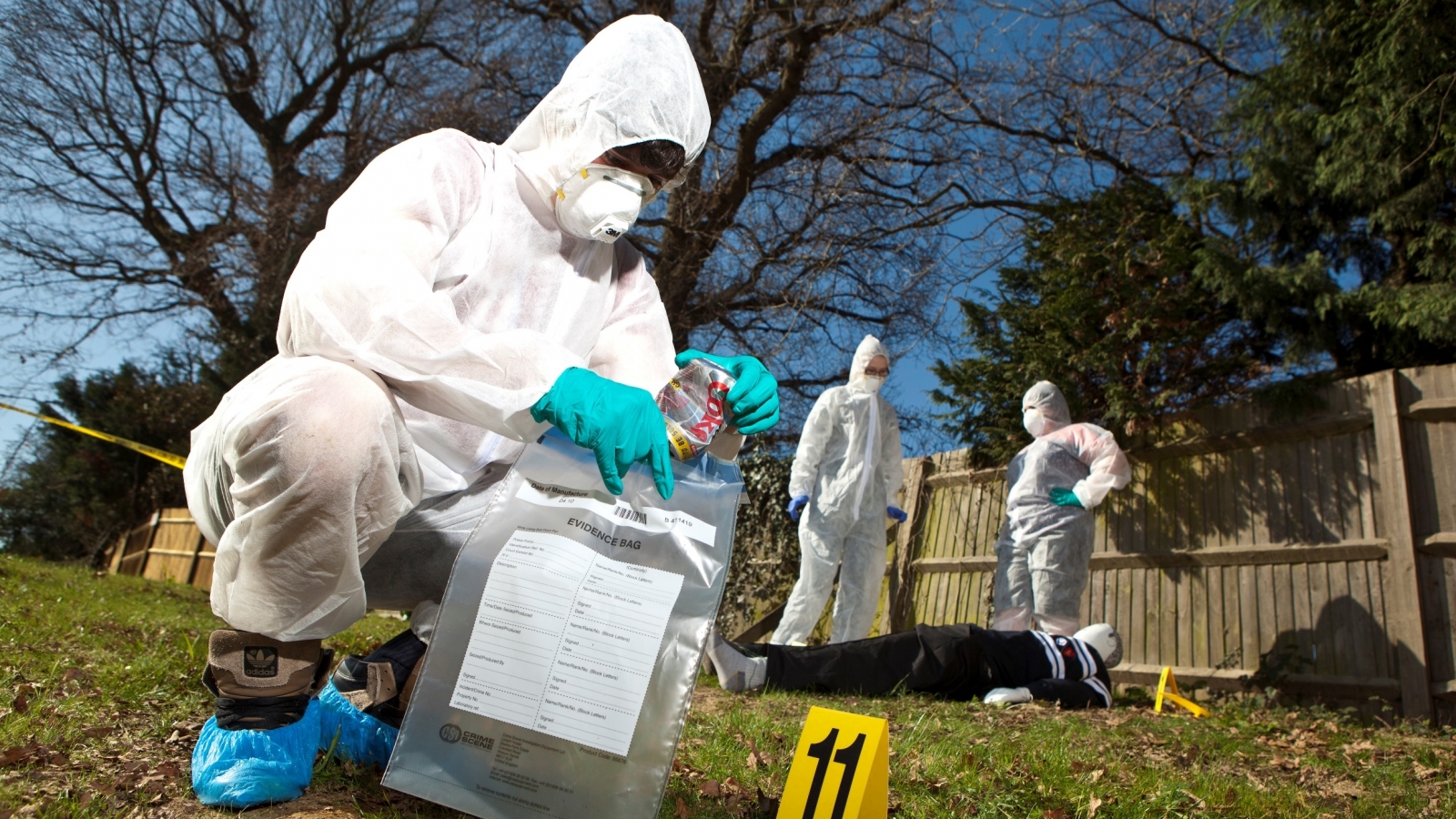
If you are looking for opportunities related to science or maths you can get ideas from friends, family, online business directories or business directories in your local library.
- Skip to primary navigation
- Skip to main content
- Skip to primary sidebar
MRC Laboratory of Molecular Biology
One of the world's leading research institutes, our scientists are working to advance understanding of biological processes at the molecular level - providing the knowledge needed to solve key problems in human health.

The LMB offers a variety of work experience placements for students in Years 10 to 13 (aged 14 and above). Our placements provide hands-on experience of working in an academic research institute. Placements may be within an LMB research group , scientific facility or support services , highlighting the variety of roles that underpin our cutting edge research.
We have partnered with Form the Future to offer in-person placements to underrepresented students at the LMB during the summer. Form the Future, a not-for-profit careers and employment company, was founded in 2015 to help young people find their route through education into employment and provide employers access to their future talent. Committed to each stage of young people’s development, the dedicated team provides schools, colleges and other groups with high-quality outsourced Careers Education, Information, Advice and Guidance (CEIAG) services.
The deadline for 2024’s applications has passed.
Additional placements will be advertised via this webpage when they become available.
If you are an undergraduate student, you may be interested in our Student Placement Scheme .
For any questions relating to work experience, please email Public Engagement Team .
Placement length
Depending which placement you apply for, the advert will tell you how long they run. Advertised work experience placements from the LMB can vary from 1-2 weeks (usually in July and August).
If selected for work experience, you will be expected to attend all days of the placement.
Food and travel expenses
For all students who applied to an advertised work experience placement via Form the Future or via our website we will cover reasonable travel expenses and offer a voucher to cover food and refreshments (approx. £5 a day) throughout their placement. This is given as a voucher which is covered in cost after spending by the LMB.
Quotes from 2023 placements
Siena – hosted by Magda Sutcliffe
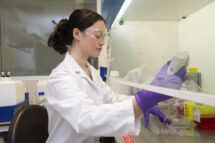
“I really enjoyed the setting. LMB is so welcoming and different to anything I have ever seen. Learning to use the various equipment was great.
I plan on pursuing medicine and so seeing how the lab work can be applied to healthcare was extremely useful. It also provided the possibility of an alternative lab job in the future.”
Tolu – hosted by Magda Sutcliffe
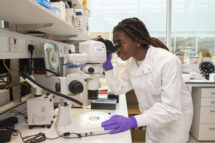
“I really enjoyed the experience at the LMB. My highlights were going into the lab and doing hands on work instead of just observing. It emphasises the difference between small school labs and real-world labs.
I want to study pharmacy, and this has solidified my decision as I’ve read an article that shows how molecular biology and pharmacy link and how it affects the medical industry.”
Annabelle – hosted by Millie-Jane Adcock
“The highlights of my time at the LMB were gaining new lab skills such as using pipettes and various robots.
This experience has sparked an interest in laboratory work and careers in research because I found the work very interesting and enjoyed working in the laboratory environment.”
Summer – hosted by Lori Passmore
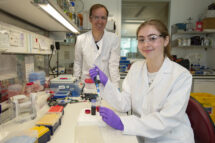
“I really enjoyed having a tour of the building to see all the equipment that gets used and learning how it’s used to aid research. I also really enjoyed the hands-on experience and getting to help conduct real experiments to see how methods are used and build my confidence and skills when doing practical work.
I felt free to ask questions about university and career paths after that and I received informative, honest answers. I plan on doing a biochemistry degree at university, and this placement confirmed that this is definitely the route I want to take.”
Mariana – hosted by Lori Passmore
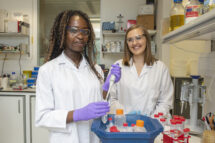
“Throughout this fantastic experience, I aided in a variety of experiments but my favourite has to be the CPF PAS changing an immature mRNA into a mature mRNA. Although the knowledge needed is years away in my academic career my hosts always ensured I understood, breaking down concepts and applying it to facts I learn in my current A-levels.
Originally, I worried about the work life balance in a research lab, but I learnt the lab is a community of people who consistently share knowledge and help each other. I plan to follow a more research focused life plan.”
Rami – hosted by Boglárka Anna Vámos
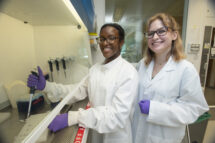
“Some of the highlights at the LMB was discovering how researchers used Cryo-electron microscopy to understand Alzheimer’s and even won an award, I found that quite inspiring. I also enjoyed using new tools and equipment for example centrifuges and vortex and learning a new way of pipetting I thought that was really engaging.
My time at the LMB has given me some clarification that I would like to do a health science (biomedicine) as before I wasn’t quite sure as I knew the content that would be taught but wasn’t sure what type of practical things I could be doing. I’ve never had any hands-on experience outside of school, so this was really eye opening and a unique opportunity to have.”
Raufaeel – hosted by Andy Howe
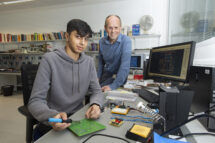
“The highlight of my time at the LMB was learning to solder as it was a new skill.
The placement has been useful in helping me make decisions about my future because I was able to receive career advice from experts and it allowed me to understand the potential risks and benefits of each one of my ideas.”
Quotes from 2022 placements
“Working in a research-focused environment was something I found very enjoyable. I liked the emphasis on taking the time to do something right instead of making something commercially for a profit.”
“My time at the LMB was my first hands-on experience in a lab outside of school. During this time, I really enjoyed learning about and seeing what a career in science might look like. I particularly enjoyed learning about and examining Drosophila melanogaster , as well as learning about how they could be used to aid research and test out theories in the lab. I also thoroughly enjoyed carrying out a bacterial protein expression and learning about the science behind this.”
“My time at the LMB has certainly been very helpful in guiding my decision-making over my future career, as it has given me first-hand insight into what a career in science might entail. I had a great time while I was here, and I plan to pursue a career in this field.”

Work experience
What is stfc.
The Science and Technology Facilities Council (STFC) is one of Europe’s largest research organisations, supporting scientists and engineers and running experiments around the UK and worldwide.
Our activities cover a wide range of science, engineering and technology, including materials science, engineering and instrumentation, particle physics, space science, accelerator-based technologies, information technology and computer science.
Inspiring young people and the wider public is one of STFC’s main objectives. This is achieved through a focused programme of public engagement, promoting careers in science, engineering and technology to maintain the quality of the UK programme.
STFC work experience programme
Daresbury Laboratory (DL), Rutherford Appleton Laboratory (RAL) and UK Astronomy Technology Centre (UK ATC) offer work experience placements to Year 10, 11, 12 and 13 students each year, many from local schools and around the country.
As far as possible they are placed depending on the interests they indicate on the application form.
COVID-19 update: the COVID-19 pandemic has affected our work experience provision. It is essential to us that we deliver an experience which is safe and useful for young people.
Find out more:
- work experience placements at DL or RAL
- work experience placements at UK ATC
For enquiries about the STFC work experience programme at:
Daresbury Laboratory
Email: [email protected]
Rutherford Appleton Laboratory
Email: [email protected]
UK Astronomy Technology Centre
Email: [email protected]
Last updated: 14 September 2023
This is the website for UKRI: our seven research councils, Research England and Innovate UK. Let us know if you have feedback or would like to help improve our online products and services .
- Work Experience Industries
- Science and Research Internships and Placements
Science & Research Internships, Placements and Graduate Jobs 2025
Your one-stop guide to launching a career in science and research; including how to get work experience, where to find the best internships and much more.

No longer confined to laboratories, scientists have a hand in almost every aspect of our lives: be it providing access to clean water, developing vaccines to target viruses or tackling climate change.
Pursuing a career in science and research will see you pushing boundaries, making discoveries and developing new technologies - all in aid of improving lives. It’s a fascinating and highly rewarding line of work.
But to break into the industry and get that competitive advantage over your peers, you’ll need to equip yourself with first-hand experience in the workplace. The best way to do this is through acquiring science and research internships or placements.
Not sure where to start? Science is a galactic industry that reaches far and wide. So, we’ve divvied up this guide into nice bite-sized sections to help you navigate your way around:
Science internships
Science placements
Research Internships
Biomedical science placements
Pharmaceutical internships
Science graduate jobs
Best Student Employers
Science internship reviews
Top Placements, Internships and Graduate Jobs in Science & Research
View all jobs
How do I get work experience in science?
It’s all very well being an expert on gene cloning or molecular orbital theory, but if you don’t have the technical skills to back this knowledge up, you’re not going to get very far in the workplace.
So, it’s absolutely crucial that you take on a science internship or placement whilst you’re still at university. Employers flip out over students who have made the effort to get this sort of experience. In fact, they increasingly use this work experience as a talent-spotting exercise for their graduate schemes.
If you stand out during your science internship, your employer might even offer you a graduate role at the end (or at least fast-track your application) - which would be a huge weight off your mind during your final year of university.
So let’s take a look at your options...

Science Internships
The majority of science internships take place in the summer months, lasting anywhere from one to four months. If you really want to get ahead, you may even be able to squeeze more than one internship into your long summer break.
Not only is this a genius way of occupying those long university holidays, but the more you do, the better idea you’ll have of where you want to take your career.
What does a science intern do?
Science interns tend to work in data analytics. They spend their days investigating a wide range of data and presenting their findings to the rest of the team.
Occasionally, they’ll be asked to carry out computer science or mathematical tasks as well, such as researching new algorithms or approaches to machine learning.
Whatever you end up doing, science internships allow you to apply the knowledge you’ve gained at university to real-world problems - which could help you attain those top grades when you return to your studies...
"The tasks are tailored to my university degree and personal development to make sure I get the most from the experience. I focused on tablet manufacturing as I knew it would be in my curriculum for the next year of university and I came out with 99.2% due to my knowledge from the placement." Summer Intern at GSK
Funding for science internships
It’s worth bearing in mind that science internships are often unpaid, although most positions are funded through research grants, departmental projects and research scholarships.
The Royal Society of Chemistry’s Undergraduate Research Bursary , for instance, supports students carrying out research internships by covering their wages for 35 hours per week at the UK National Living Wage (£10.42 per hour from April 2023) - for up to eight weeks.
A number of organisations give out bursaries to help interns cover their costs. Make sure you do your research thoroughly as the requirements and application process vary greatly. Head over to British Neuroscience Association’s website for a comprehensive list of funding bodies .
Science Placements
Placements are essentially the same as internships - only they last longer. You’ll spend up to a whole year working full-time for an employer.
A science placement is your chance to show initiative, make a good impression and start building an invaluable network of industry contacts.
You’ll also get an insight into how the company operates and what your specific role entails - all while advancing your own technical skills and academic knowledge - like this placement student at Pfizer.
"My placement year was an extremely valuable experience that enabled me to gain an insight into the industry, expand my professional network and develop skills that will help me in my future career. This has opened my eyes to the range of career opportunities available in the industry." Undergraduate Community and STEM Project Manager at Pfizer

Internships in Research
Naturally curious? Want to be at the forefront of scientific development? As a research scientist, you’ll be responsible for designing, conducting and analysing the results of cutting-edge experiments.
However, research and development (R&D) is a tough field to get into. Employers look for bright candidates with inquisitive minds, and postgraduate qualifications - such as a Master’s degree or PhD - are often a requirement.
Not to worry, there are plenty of research internship opportunities in the UK that can give you the experience you need to go far in this career.
A research internship won’t see you staring into Petri dishes all day long. Instead, it is a chance to work alongside leading scientists on actual research projects.
What does a research intern do?
As a research intern, you’ll have a wide range of roles and responsibilities. One minute you might be compiling data, and the next implementing ideas or helping your team write papers.
In general, you’ll be expected to carry out the following tasks:
Managing client enquiries and concerns
Sharing strategies and recommendations on research methods
Recruiting test subjects
Preparing product samples for testing.
How do you get a research internship?
There’s no one-size-fits-all approach to getting a research internship, though networking can really open doors for your career. The best place to start would be to attend seminars, workshops and symposiums.
Here you’ll meet people with similar interests as you, who’ll be able to point you in the right direction and help you connect with professors in your field.
Here are THREE of the finest companies in the land offering research internships:
Cancer Research UK
Cancer Research UK runs a 12-week cancer research internship three times a year in January, July and September. As well as paying the National Living Wage, this programme offers the chance to develop key business skills whilst playing your part in the fight against cancer.
This fast-moving consumer goods company runs both a 12-month industrial placement programme and a 12-week summer research internship. Top performing students at Unilever can earn themselves a place on their Future Leaders Programme for graduates.
British American Tobacco
Making significant investments in R&D to develop potentially less risky alternatives to cigarettes, British American Tobacco offers 12-month research placements to undergraduates. As an R&D intern, you’ll play a part in discovering, developing and deploying their innovative products.
Biomedical Science Placements and Internships
From providing doctors with vital scientific research to investigating causes of infection, biomedical scientists play a pivotal role in our society. In fact, biomedical science, AKA ‘the science at the heart of healthcare’, underpins much of modern medicine.
DID YOU KNOW?
70% of all medical diagnoses are attributed to the work of biomedical scientists
They make up 5% of the NHS workforce
150 million samples are handled by laboratory services every year.
To kickstart a career in biomedical science, it’s crucial you gain as much experience as you possibly can before you graduate.
As well as a biomedical science placement or internship, to gain your first role you’ll need a strong foundation of scientific knowledge in the form of relevant GCSEs, A-Levels and a degree that’s been accredited by the Institute of Biomedical Science (IBMS).
Most IBMS-accredited university courses have an integrated placement year. If that’s not the case, you’ll find plenty of short-term internships, including...
The National Health Service (NHS)
The NHS offers biomedical science placements, internships and assistant roles all year round.
"It has set me up with the skills for life! Following the completion of my degree and my placement, I got a full-time job as a fully qualified biomedical scientist at another hospital who were very impressed with my knowledge and skill sets gained through my placement." Biomedical Science Trainee at the NHS
Wellcome Trust
This global research charity runs an eight-week summer internship based in their London office. The programme pays the London Living Wage of £13.15 an hour, and is an opportunity to work with fellow interns and experienced staff alike in the area that most interests you.
Universities
Many run their own biomedical science internships in the summer, giving students the chance to work on research projects being carried out by in-house academic teams. Speak to your head of department or tutor to explore what your university has to offer.
Is biomedical science in demand?
The more new drugs and treatments are developed, the greater the demand for biomedical scientists. Their efforts during the COVID-19 pandemic highlighted the crucial role they play in saving lives and improving our health outcomes.
A team of biomedical scientists at North Tees and Hartlepool NHS Foundation Trust, for example, carried out more than 100,000 PCR tests in just 12 months.
Medical biology is a broad sector, so your career options will be seemingly vast when choosing this profession. Operating theatres, A&E and other hospital departments simply wouldn’t function without biomedical scientists.
So whether your speciality is in disease diagnosis or researching new medicines, this profession is increasingly important and constantly evolving to meet societal needs.
What job can you do with biomedical science?
Biomedical scientists investigate all sorts of medical conditions; from cancer to diabetes, blood disorders and AIDS. The work is practical, analytical and highly varied.
As such, there are plenty of jobs you can do with a degree in Biomedical Science or Healthcare Science, including:
Biotechnologist
Clinical research associate
Clinical scientist, biochemistry
Clinical scientist, hematology
Clinical scientist, immunology
Forensic scientist
Microbiologist
Physician associate
Research scientist (life sciences)
Research scientist (medical)
Scientific laboratory technician
Toxicologist.
Pharmaceutical Internships
Touching millions of lives every day, this industry develops, tests and manufactures lifesaving drugs to combat everything from HIV and AIDS to high blood pressure.
Over 65,000 people in the UK work for pharmaceutical companies; including research scientists, pharmacists, lawyers, engineers and marketeers. Depending on your skill set, you could end up doing anything from running clinical trials to selling pharmaceutical drugs.
A pharmaceutical internship or placement involves working on projects alongside some of the world’s top experts in their field. This is an excellent opportunity to develop essential soft skills and technical knowledge; something that will both complement your studies and boost your CV.
Pharma companies usually ask that you are on track to achieve a 2:1 or above in a relevant degree discipline. For instance, if you want to work in drug research & development, you’ll need a degree in Chemistry, Biology or Pharmacology.
Want to find out more? Head over to our guide to Pharmaceutical Placements for expert advice, employer case studies and a few mind-blowing facts.
What is a science graduate job?
Science graduate jobs are your first step on the permanent career ladder once you finish university and get your Bachelor of Science (BSc) degree. You’ll work for a company where:
You’ll build new skills
Collaborate with like-minded people from your area of discipline
Take up responsibility right from the start.
A science internship or placement can boost your chances of getting a science graduate job and make the transition into the working world smoother. If you haven’t got work experience, you can always bring transferable skills from your degree to the role.
Are science graduate jobs paid?
You’ll be pleased to know that science graduate jobs are paid. The national average salary for a science graduate is £25,000 a year. But this depends on your role, employer and location.
The more experience you gain though, the more you’ll earn through raises and promotions.
As a senior biomedical scientist, you could take home £53,000 a year!
How long do science graduate jobs last?
There’s no limit to science graduate jobs. If you love your role and feel genuinely invested in the company, you might stay on and progress to a senior position. If not, you’ll move onto something else that’s more aligned with your values and interests.

What’s the difference between a science graduate job and a science graduate scheme?
Graduate jobs and graduate schemes sound pretty similar. For a start, both have the word ‘graduate’. Both share ‘relations’ (of some sort). However, they do have their differences.
Permanent VS temporary
Graduate schemes:
Temporary (one to three years)
Can become permanent after completion.
Graduate jobs:
Permanent roles from day one
Length of employment is up to you.
Structured training
Experience different parts of the business
Work in areas including research and development or supply chain management.
Standard training (enough to familiarise you with the role)
Work in one role and team.
Application process
Longer application process
Need for aptitude tests.
Shorter application process
Graduate CV, cover letter and interview.
Applications open between September and November
Interviews and assessment centres take place in January.
Go live as and when a role is needed.
Best Student Employers in Science
If you decide to embark on a career in science, you could be hired by a global corporation, research centre, charity, start-up, engineering firm or even a newspaper! Just like the multiverse, there are infinite possibilities.
To help you cut through the noise, we’ve compiled a list of the best companies to work for as an undergraduate or graduate in the science industry.
Each of these ranked in our Best Student Employers , based on thousands of student-written reviews submitted to RateMyPlacement.co.uk. This means they are the crème de la crème when it comes to company culture, work-life balance, employee perks and more.
GlaxoSmithKline (GSK)
Johnson and Johnson
AstraZeneca
Science Placement Reviews
There are so many opportunities for students looking to get first-hand experience in science and research that it can be tricky to find the right role for you.
Here at RateMyPlacement.co.uk, we’re dedicated to helping young people make informed decisions about their futures. Which is why we host thousands of reviews of science internships and placements. Nearly 3,000 of them in fact.
All of these have been left by students who have carried out some form of work experience in science and research. The reviews are their chance to shout about their time with an employer; be it positively or negatively!
Still figuring out what you want to do? It may be that you’re not sure you want to stick with science, or perhaps you’re torn between working for a global corporation or an SME . Whatever your concern, nothing beats hearing the truth straight from the horse’s mouth.
Browse science work experience reviews
Companies you may be interested in

Womble Bond Dickinson

Mercedes-AMG Petronas Formula One Team


- Our strategy
- Our leadership
- How we’re funded
- Our history
- Therapeutics
- Diagnostics development
- Funding, projects and partnerships
- Available technologies
- LifeArc Ventures
- IP management and tech transfer
- Policy and public affairs
- Motor Neuron Disease
- Chronic Respiratory Infection
- Antimicrobial Resistance
- Neglected Tropical Diseases
- Emerging Viral Threats
- Rare Disease
- Childhood Cancer
- Benefits and rewards
- Early careers
- Current vacancies
Virtual work experience
Step into the shoes of a lifearc team member and complete tasks that replicate the work that our biology research team does everyday..
Duration: 4-6 hours
Sign up at any time

Course information
Who is it for.
Anyone keen to gain work experience or discover more about life sciences at LifeArc can complete the programme. It is particularly suited to first- and second-year undergraduates who may not be eligible for in-person work experience programmes.
The course outline
This bespoke LifeArc programme has four modules on Biology at LifeArc. You can complete the modules at your own pace – it should take you approximately 4-6 hours in total. You’ll gain skills that could help with your onward studies and you’ll also receive a certificate that you can add to your CV and LinkedIn profile to stand out from the crowd.
What will you learn?
You’ll learn how to optimise experimental conditions, analyse data to determine optimal conditions, synthesise evidence and present your results. This is carried out through 4 modules.
1. Optimise experimental conditions In this module, you’ll learn how to design a multiplexed experiment to optimise an in vitro neuronal differentiation protocol.
Practical skills include:
- Critical analysis
- Extracting relevant information
- Experimental controls
2. Analyse data to determine optimal conditions In the second section, you’ll learn about visualising and performing statistical analysis of experimental data from an imaging assay using RStudio, which you can download for free.
- Data visualisation
- Statistical analysis
- Reporting analysis & results
3. Synthesising evidence and collaboration Here, you’ll see how to integrate the results of your data analysis with findings by your colleague and discuss a way forward.
- Data analysis
- Collaboration
- Communication
- Adaptability
4. Present your results In the final module, we’ll guide you on how to present your and your colleague’s experimental results and provide suggestions for the way forward.
- Presentation of data results

Strengthen your CV as you explore career options.
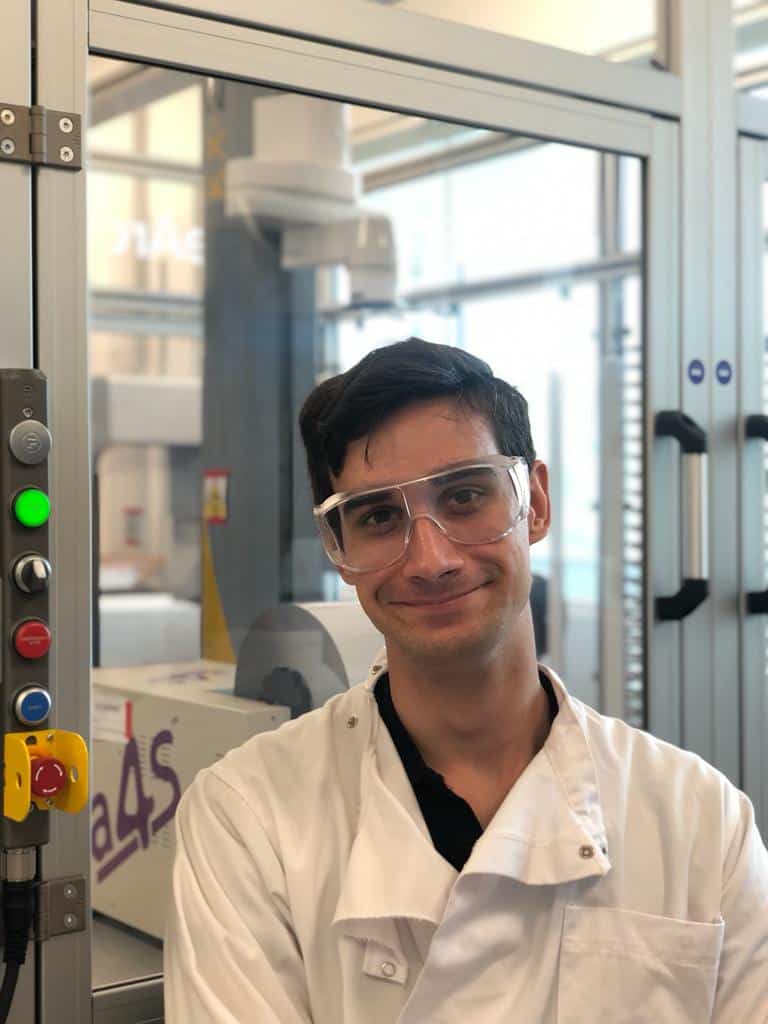
The virtual work experience programme is an excellent opportunity to see what the day-to-day workings of an industrial research scientist looks like. The lessons are online, so while we may not be in the lab, these skills are the bread and butter of innovation.” Finbar, Scientist in Molecular and Cellular Pharmacology
More career opportunities

Fellowship opportunities
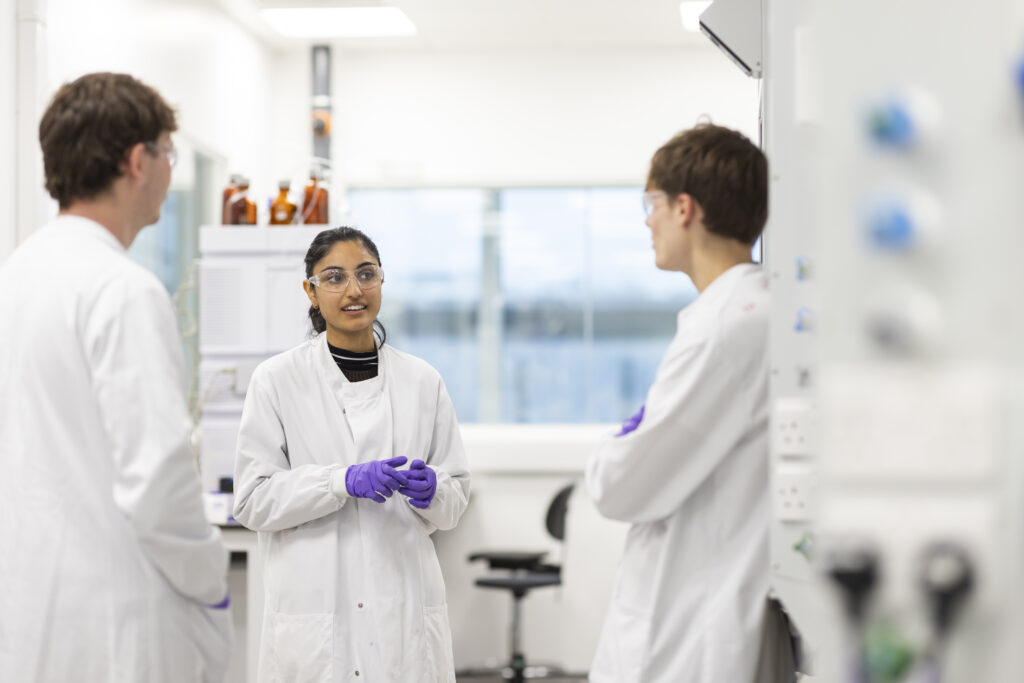
Industrial placement opportunities
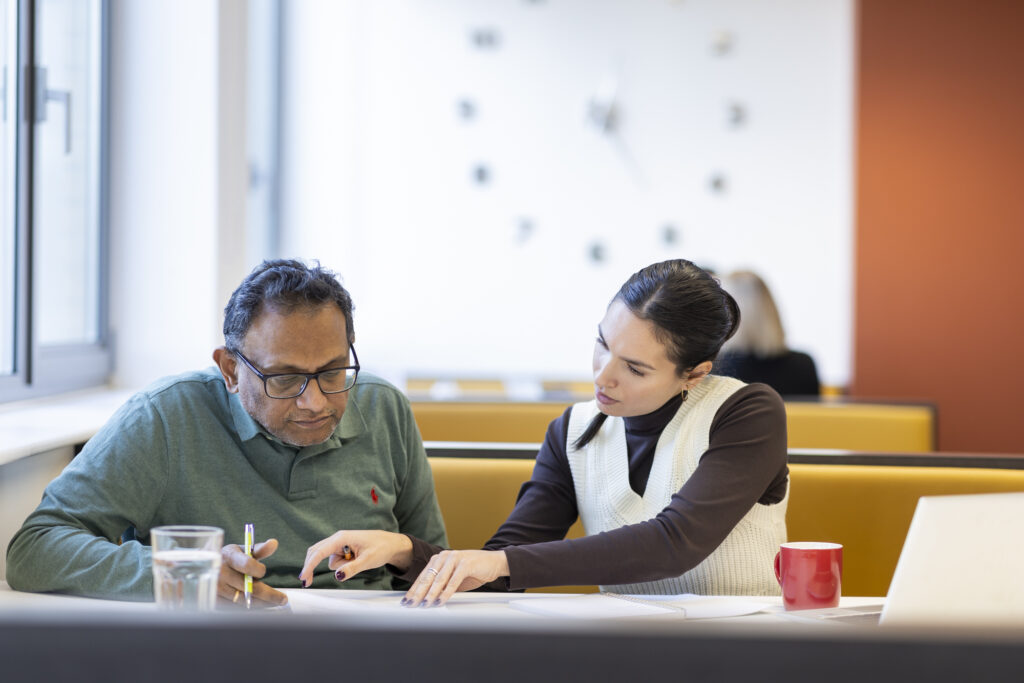
Opportunity Assessment Group (OAG) internship
In submitting your personal data via this form, you consent to being contacted via the details provided so that your enquiry can be responded to. If you would like your data to be removed, please email [email protected].
Please see our Privacy Policy in relation to the personal data you submit to us through this page.
- Search Search Please fill out this field.
- Career Planning
- Finding a Job
12 Best Careers in Science
Dawn Rosenberg McKay is a certified Career Development Facilitator. She has written hundreds of articles on career planning for The Balance.
:max_bytes(150000):strip_icc():format(webp)/DawnMcKayheadshot2-5b75b1dac9e77c00255d50e2.jpg)
Biochemist or Biophysicist
Conservationist, environmental scientist, environmental science and protection technician, forensic scientist, geoscientist, hydrologist, medical scientist, computer and information research scientist, atmospheric scientist, nuclear technicians.
Hinterhaus Productions / Getty Images
Imagine a world without scientists. People who work in science careers are responsible for many of the things we, as a society, benefit from every day—ways to prevent and cure diseases, new technology, and strategies to help control climate change.
To prepare for a science career, you will have to study either life or physical science. Life sciences involve learning about living organisms and include subjects like biology, biochemistry, microbiology, zoology, and ecology. Physics, chemistry, astronomy, and geology are all physical sciences, which deal with the study of non-living matter.
Here are 12 science careers. The U.S. Bureau of Labor Statistics (B.L.S.) predicts that employment in most of these occupations will grow at least as fast as the average for all occupations between 2022 and 2032. Many will grow faster or much faster than the average. You may also be interested in learning about STEM careers, health professions, and health technology careers.
Biochemists and biophysicists study the chemical and physical properties of living things and biological processes. To work in this field, you will need at least a bachelor's degree in biochemistry, biology, chemistry, or physics for an entry-level job. A doctorate is required to do independent research or work in development.
Median Annual Pay (2023) : $107,460
Number of People Employed : 34,500
Projected Job Growth (2022–2032) : 7% (faster than the average for all occupations)
Projected Jobs Added (2022–2032) : 2,300
Chemists study chemicals and how they can be used to improve our lives. You will need a master's degree or Ph.D. in chemistry for most research jobs, but a limited number of positions require only a bachelor's degree.
Median Annual Salary (2023) : $87,180
Number of People Employed (2022) : 95,000
Projected Job Growth (2022–2032) : 6% (faster than average)
Projected Jobs Added (2022–2032) : 5,800
Conservationists help landowners and governments find ways to protect natural resources such as soil and water. To get a job in this field, you will have to earn a bachelor's degree in ecology, natural resource management, agriculture, biology , or environmental science .
Median Annual Salary (2023) : $68,300
Number of People Employed (2022) : 36,000
Projected Job Growth (2022–2032) : 4% (as fast as average)
Projected Jobs Added (2022–2032) : 1,300
Environmental scientists identify, reduce, and eradicate pollutants and other hazards that threaten the environment or the population's health. You can get an entry-level job with a bachelor's degree in environmental science, biology, engineering, chemistry, or physics, but if you hope to advance, you might need a master's degree.
Median Annual Salary (2023) : $78,980
Number of People Employed (2022) : 80,500
Projected Jobs Added (2022–2032) : 4,900
Environmental science and protection technicians—sometimes called environment technicians—monitor the environment, investigate sources of pollution, and work under environmental scientists' supervision. You will have to earn an associate degree or a certificate in applied science or science-related technology, but some jobs require a bachelor's degree in chemistry or biology.
Median Annual Salary (2023) : $50,660
Number of People Employed (2022) : 35,000
Projected Jobs Added (2022–2032) : 2,000
Forensic scientists—also known as forensic science technicians or crime scene investigators—collect and analyze physical evidence. Many employers prefer applicants with bachelor's degrees in fields such as chemistry, biology, or forensic science.
Median Annual Salary (2023) : $64,940
Number of People Employed (2022) : 18,500
Projected Job Growth (2022–2032) : 13% (much faster than average)
Geoscientists search for natural resources or help environmental scientists clean up the environment. To get an entry-level research position you will need at least a bachelor's degree in geoscience or earth science, but some positions may require a master's degree.
Median Annual Salary (2023) : $92,580
Number of People Employed (2022) : 26,300
Projected Job Growth (2022–2032) : 5% (faster than average)
Hydrologists study bodies of water, both on the earth's surface and underground. They look at their circulation, distribution, and physical properties. To work in this field, you will need at least a bachelor's degree, although some employers prefer candidates with a master's degree.
Median Annual Salary (2023) : $88,770
Number of People Employed (2022) : 6,600
Projected Job Growth (2022–2032) : 1% (little or no change)
Projected Jobs Added (2022–2032) : 100
Medical scientists research the causes of disease. They also look for ways to prevent and cure them. Most medical scientists have a Ph.D. in biology or similar fields. Some medical scientists get a medical degree instead of a doctorate.
Median Annual Salary (2023) : $100,890
Number of People Employed (2022) : 119,000
Projected Job Growth (2022–2032) : 10% (much faster than average)
Projected Jobs Added (2022–2032) : 11,600
Computer and information research scientists research and design computing technology. These scientists typically need a master's degree in a field such as computer science. Federal government jobs in this field may have less stringent education requirements.
Median Annual Salary (2023) : $145,080
Number of People Employed (2022) : 36,500
Projected Job Growth (2022–2032) : 23% (much faster than average)
Projected Jobs Added (2022–2032) : 8,300
Atmospheric scientists study issues relating to weather and the climate. Meteorologists you may see on TV fall into this career category. Atmospheric scientists usually need a bachelor's degree, although research positions typically require a master's degree or doctorate.
Median Annual Salary (2023) : $92,860
Number of People Employed (2022) : 10,500
Projected Jobs Added (2022–2032) : 500
Nuclear technicians assist physicists, engineers, and other high-level scientists with their nuclear research and energy production. Unlike top-level nuclear careers, technicians typically only need an associate's degree to get started. Once working, these professionals will have extensive on-the-job training.
Median Annual Salary (2023) : $101,740
Number of People Employed (2022) : 5,900
Projected Job Growth (2022–2032) : -1% (little or no change)
Projected Jobs Added (2022–2032) : -100
Bureau of Labor Statistics. " Biochemists and Biophysicists ."
Bureau of Labor Statistics. " Chemists and Materials Scientists ."
Bureau of Labor Statistics. " Conservation Scientists and Foresters ."
Bureau of Labor Statistics. " Environmental Scientists and Specialists ."
Bureau of Labor Statistics. " Environmental Science and Protection Technicians ."
Bureau of Labor Statistics. " Forensic Science Technicians ."
Bureau of Labor Statistics. " Geoscientists ."
Bureau of Labor Statistics. " Hydrologists ."
Bureau of Labor Statistics. " Medical Scientists ."
Bureau of Labor Statistics. " Computer and Information Research Scientists ."
Bureau of Labor Statistics. " Atmospheric Scientists, Including Meteorologists ."
Bureau of Labor Statistics. " Nuclear Technicians ."

Quick links
- Climate change
- COVID-19 research
- Staff profiles
CSIRO's Virtual Work Experience Program
Providing first-hand, relevant work experience for students in an online, scientific environment, and creating professional development opportunities for STEM supervisors.
About the program
The Virtual Work Experience program (VWE) connects a small group of school students with CSIRO and industry professionals, to work on a project, helping inform their study and/or career plans. Experienced CSIRO staff and/or STEM industry professionals remotely supervise the students, and guide them through tasks to complete a project that gives them an insight into real-world CSIRO research and industry challenges. The program is designed for year 10 and 11 students enrolled in school anywhere in Australia. The virtual nature of the program opens-up the opportunity to students who may face geographic or other barriers to participating in traditional, in-person work experience. There is an application process that students and supervisors must go through to participate in the program, which takes place over a week between March/April and December.
Learn more about our VWE initiative
Apply for the program
We are not currently accepting applications from students or supervisors for the Virtual Work Experience program. Subscribe to our mailing list to be notified of upcoming opportunities.
The opportunity
Work experience is a great way for high school students to start exploring what they might like to study or what kind of career they might like to pursue. The virtual program enables Year 10 and Year 11 students to benefit from work experience no matter where they live, removing travel, geographic and cost constraints. Students participate using a secure online communication and collaboration platform while at school, home or a supported community venue, such as a library.
Groups of up to 10 students connect with CSIRO staff or industry professionals, and work together on a real-world STEM challenge, over the course of a week. At the end of the week, the students will have produced a project that responds to an industry challenge, that they can add to their portfolio of work for applications to further study or jobs.
CSIRO staff or STEM professionals who participate as supervisors agree to prepare a task for the students to work on, and to guide and mentor them throughout the week as students build up to presenting a final project. The CSIRO Work Experience team assists supervisors to optimise projects for online collaboration with students. Supervisors may also arrange for colleagues to speak to the student group about their own roles. This helps the students understand the breadth of roles in STEM and to spark ideas about the area of STEM that interests them most.
Program eligibility
Students To be eligible to participate, students must be:
- in year 10 or 11, and aged 15-17 years for the duration of the work experience
- enrolled in a school in Australia
- able to commit to a designated week between March/April and December
- be supported by a teacher, parent or other approved adult in their physical location throughout their work experience project.
It is free of charge for students to participate, and there will be no payment made to students for participation. Due to limited places available, CSIRO cannot guarantee participation for all students applying to be involved.
Supervisors Supervisors should consider the commitment before applying to mentor students through this program. This includes meeting with students online for an hour in the morning and an hour in the afternoon each day, as well as setting and monitoring tasks, and reviewing students’ projects.
Supervisors will participate in a short (30-60 minute) presentation from CSIRO on how to use the SAP Jam platform for the program. Supervisors must have a Working with Children/Vulnerable People check, and must attend a 2-hour child safety training session.
How to apply
We are not currently accepting applications from students or supervisors for the Virtual Work Experience program. Please subscribe to our mailing list to be notified of upcoming opportunities.
Program outcomes
An evaluation of the program undertaken by CSIRO in 2019 found that students gained valuable experience in STEM and in new ways of working, while developing crucial life skills, such as teamwork, communication, negotiation and resilience. The virtual aspect of the program mimics the way CSIRO staff work every day, providing students with realistic expectations and building valuable skills for successfully working remotely in the future. At the end of the program, students produce a project that they can use in a portfolio of work when applying for further study or jobs.
Supervisors and their colleagues report unexpected benefits for their own professional development and job satisfaction through participating in the program. For example, sharing their career story to an enthusiastic group of students reconnects them with their original reasons for pursuing a career in STEM. For scientists who have little opportunity for public speaking, the chance to present their work in a low-risk environment enables them to further develop their skills in that areas. Beyond that, supervising young students builds mentoring and coaching skills that helps them guide their own teams on a day-to-day basis.
Have a question we haven't answered on our site? Fill in our contact form and we'll get back to you promptly.
Get in touch using the form below and our team will get in contact soon. CSIRO will handle your personal information in accordance with the Privacy Act 1988 (Cth) and our Privacy Policy .
Find out how we can help you and your business. Get in touch using the form below and our experts will get in contact soon!
CSIRO will handle your personal information in accordance with the Privacy Act 1988 (Cth) and our Privacy Policy .
Enter a valid email address, for example [email protected]
A Country value must be provided
First name must be filled in
Surname must be filled in
Please choose an option
Organisation must be filled in
Please provide a subject for the enquriy
We'll need to know what you want to contact us about so we can give you an answer
We have received your enquiry and will reply soon.
We're Sorry
The contact form is currently unavailable. Please try again later. If this problem persists, please call us with your enquiry on 1300 363 400 or +61 3 9545 2176. We are available from 9.00 am to 4.00 pm AEST Monday - Friday.

Study at Cambridge
About the university, research at cambridge.
- Events and open days
- Fees and finance
- Student blogs and videos
- Why Cambridge
- Qualifications directory
How to apply
- Fees and funding
- Frequently asked questions
- International students
- Continuing education
- Executive and professional education
- Courses in education
- How the University and Colleges work
- Visiting the University
- Term dates and calendars
- Video and audio
- Find an expert
- Publications
- International Cambridge
- Public engagement
- Giving to Cambridge
- For current students
- For business
- Colleges & departments
- Libraries & facilities
- Museums & collections
- Email & phone search
- Cancer Research UK Cambridge Institute
- Work experience and internships
- Transparency in research
- Support our research
- Virtual tour
- Research involving animals
- Equality, Diversity and Inclusion
- Response to COVID-19
- Getting here
- Research Groups
- Core Facilities
- Life at the Institute
- Career development
- College membership
- Support and supervision
- Student community
- Student Testimonials
- Undergraduate Summer Research Programme
- Cambridge Makerere Summer School
- Cambridge Festival
- Institute news
- CRUK Science Blog
- Our Progress

Careers Lab: work experience programme
Take your first step into a career in cancer research.

Our Careers Lab Work Experience Programme provides sixth form (Year 12 and Year 13) students with a week-long opportunity to explore various career paths within the Cancer Research UK Cambridge Institute. Aimed at those interested in gaining practical insights into different professional fields, the programme challenges preconceptions about working in science while aligning with our mission to our aim to beat cancer sooner.
We currently offer two distinct types of placement:
1) Year 12/13 Research Placement
Engage in hands-on experiences within our cutting-edge research laboratories, delving into the world of cancer biology. Gain exposure to state-of-the-art Core Facilities, teams dedicated to developing and applying specific technologies, and learn from experts in microscopy, genomics and animal technology. While each placement is unique to its research group, expect to acquire skills and experiences such as:
- How to culture cells
- Tissue staining techniques
- Understanding the basics of microscopy and tissue compositions
- How to isolate and multiply DNA
2) Year 12/13 Operations Placement
Explore non-scientific roles within our Operations Team, responsible for the seamless functioning of the Institute. This placement offers insights into various departments, including Finance & Grants, Human Resources, and Property Services. Our operations staff come from a range of backgrounds, and no scientific background is required for this placement. Rotations could include:
- Managing a multi-million-pound portfolio of grants
- Attracting top scientists to join our labs
- Creating a culture where science and fun intersect
- Creating and maintaining the physical environment of the Institute
Whether you’re passionate about science or seeking a non-scientific career path to enable vital cancer research, our programme opens doors to a diverse range of opportunities within the Cancer Research UK Cambridge Institute.
Eligibility
Applicants must be enrolled in sixth form, or equivalent, and currently in Year 12 or Year 13.
What are we looking for?
- Interest in the programme: We seek candidates who genuinely demonstrate a keen interest in the Careers Lab programme, showcasing a passion for the opportunities it presents and a clear understanding of how it aligns with their personal and professional goals.
- Intellectual curiosity: We value candidates who exhibit a strong sense of intellectual curiosity, an eagerness to explore new ideas, and a proactive approach to learning. Individuals who enjoy delving into diverse topics and consistently seek to broaden their knowledge are highly regarded.
- Perseverance: Perseverance is a key attribute we look for in candidates. We seek individuals who demonstrate resilience, determination, and the ability to navigate challenges effectively. Candidates who view setbacks as opportunities for growth and consistently strive to overcome obstacles align well with this criterion.
- Commitment to improving the lives of others: We are interested in candidates who show a genuine commitment to making a positive impact on the lives of others. This can manifest in various forms, such as a dedication to community service, a passion for social causes, or a desire to contribute to the well-being and advancement of individuals and communities.
Applicants are encouraged to reflect on these criteria and showcase specific examples from their experiences that highlight their alignment with these qualities.

- Application Period: 10 January 10 – 12 February 2024
- Interviews Scheduled (Virtual): February – March 2024
- Reference Check for Shortlisted Candidates: Mid-March 2024
- Final Placements Confirmation: Late April 2024
- Careers Lab Programme (In Person): 1 July – 5 July 2024
Application form:
- Complete a 5-10 minute form providing academic and personal details.
- Express why you are interested in applying for the Careers Lab programme.
Careers Lab personal statement (within the application form): Respond to the following prompts within the application form:
- In no more than 100 words, explain why you are applying for this programme.
- In no more than 100 words, describe the skills you currently possess and identify the skills you need to gain for success in your dream career.
Sixth Form College Reference: If shortlisted for an interview, we will contact a member of staff at your school or sixth form colleg e. They will be asked to provide an assessment based on the following criteria:
- Interest in the programme
- Intellectual curiosity
- Perseverance
- Commitment to improving the lives of others
Applications for 2024 have now closed. Please check back in the new year for future opportunities.
How we select
Careers Lab uses a comprehensive two-stage selection process to ensure that our placements align with our criteria:
Application Form: To be considered for a Careers Lab Work Experience placement for Year 12/13, completion of the application form in full is mandatory.
Shortlisting and Interview: Shortlisted candidates are invited to a virtual interview to assess their alignment with the four Careers Lab criteria. The brief interview will assess your motivations for applying to the programme. Alternative arrangements will be made to accommodate individuals with limited internet accessibility.
Details about the format and arrangements will be sent according to the application timeline. The interview consists of three main sections:
- Welcome and introduction
- Interview questions
- Final thoughts and answering your questions
If not called for an interview, you will receive an email confirming that your application was not successful.
Please note that we are not able to provide feedback to unsuccessful applicants.
Contact us: [email protected] with any additional queries!
Undergraduate Summer Research Placements
If you are an undergraduate student, looking to find a research placement over the summer vacation period, please visit our Summer Research Placements page.
For any other questions, please get in touch using our contact form .
CRUK CI staff links
Contact cruk ci, useful links.
- Privacy statement
- Terms and conditions
Connect with us
© 2024 University of Cambridge
- University A-Z
- Contact the University
- Accessibility
- Freedom of information
- Undergraduate
- Spotlight on...
- About research at Cambridge
This Site Uses Cookies
We may use cookies to record some preference settings and to analyse how you use our web site. We may also use external analysis systems which may set additional cookies to perform their analysis.These cookies (and any others in use) are detailed in our site privacy and cookie policies and are integral to our web site. You can delete or disable these cookies in your web browser if you wish but then our site may not work correctly.
Home › University › 145 Work Experience Ideas for Year 10
145 Work Experience Ideas for Year 10
- Published March 15, 2024

Finding work experience in Year 10 can be a challenge. Ideally, you should look to find a place of work that matches your future career goals; that way, you’ll be better prepared for what’s to come. Plus, gaining experience could help with university applications and is a great advantage for your personal statement. Read how to write a great personal statement for work experience .
Work experience is an invaluable opportunity for you to gain skills that will benefit your future career. However, you might be feeling lost about where you can work, especially since some workplaces don’t have work experience placements for those under 18.
Not to worry, though. Here are some work experience ideas for year 10s for every industry, with 5+ ideas for each sector.
Business Work Experience
Business is a very broad topic to cover. If you’re doing business studies or interested in how business works, here are some great Year 10 work experience ideas that will allow you to see how a business ensures profitability behind the scenes.
- Work at a consultancy firm.
- Work for an estate agent.
- Work in a HR department.
- Work for an insurance firm.
- Work at the ‘Big Four’ – PwC, EY, Deloitte, and KPMG (note: these placements are extremely competitive).
- Get work experience through a summer programme.
- Shadow a project manager who works in a field you’re interested in.
- Shadow a data analyst at a company like Purple Frog Systems .
Discover a Business Management work experience summer programme
Creative Arts Work Experience
Creative arts is also a broad field. It includes arts, drama, and even graphic design. If you’re a creative person, here are some work experience options.
- Participate in art, design, or photography workshops.
- Work at an art gallery or museum.
- Work at an art auction to learn more about art sales.
- Work at a graphic design agency.
- Work at a cinema (this doesn’t have to be serving customers; you can also work behind the scenes to figure out staff and film schedules).
- Work at a theatre.
- Shadow an interior designer.
- Volunteer at crafts events in community centres, churches, and schools.
Find out more about our Fine Art summer programme
Engineering and Architecture Work Experience
Although architecture and engineering are different fields, there are a lot of crossovers. These work experience ideas will help you learn more about design and construction processes in general.
- Shadow an architect or engineer at work.
- Work at a builder’s merchant (Year 10s aren’t allowed on building sites, but you can learn about building by working in a merchant’s to learn stock replenishment, customer service, and more).
- Work at an urban planning company such as the Royal Town Planning Institute’s 1-Week Work Experience Programme .
- Work with an airline or in an airport to learn about aircraft engineering; try the British Airways engineering work experience programme .
- Work with a motorsports team by emailing their HR departments.
Find out more about our Engineering and Architecture career summer programmes
Environment and Geography Work Experience
Geography often covers both environmental and urban projects. As a result, there are plenty of work experience options for those interested in this field.
- Volunteer at an environmental charity (like Friends of the Earth) to take part in fundraising.
- Work at an urban planning and development company.
- Shadow a geologist; you can find one in the Geologist’s Online Directory .
- Shadow a travel agent to learn more about tourism.
- Volunteer at a nature reserve through The Wildlife Trust .
- Do a work experience placement with the British Geological Survey .
- Volunteer at the Duke of Edinburgh Awards Scheme .
- Work at the Met Office through their MetLink work experience scheme .
Event Planning and Management Work Experience
If you like planning, then management could be for you. Here are some work experience ideas.
- Shadow a manager at a local business.
- Shadow an event planner.
- Get involved with local events or festivals (note: some festivals are only open to those over 18).
- Volunteer at a non-profit event to get hands-on experience.
- Work at a venue.
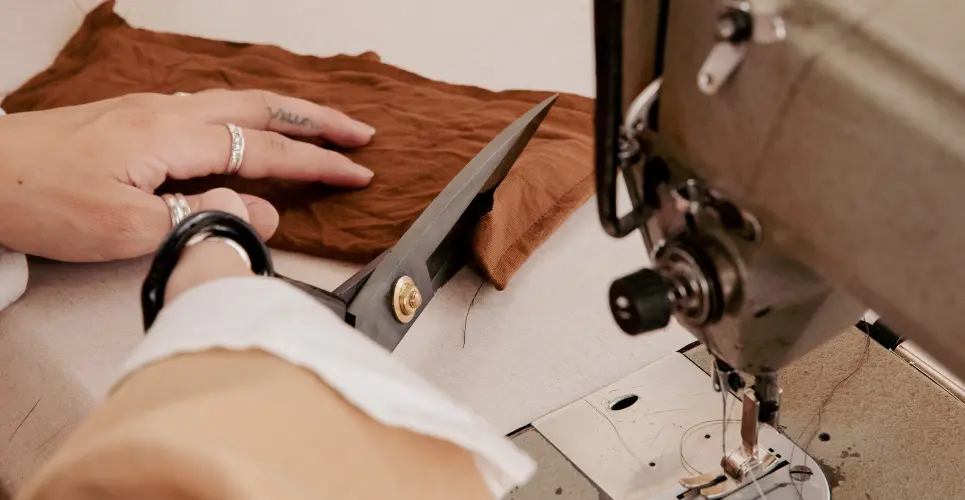
Fashion Work Experience
The fashion industry can be hard to break into, so work experience is highly valuable. Here are some fashion work experience ideas for Year 10.
- Volunteer with a costume maker.
- Work at a local boutique or clothing store.
- Shadow a fashion designer.
- Volunteer at a fashion show.
- Work with a stylist on photo shoots.
- Intern at a fashion magazine.
- Create your own fashion portfolio.
- Shadow a personal shopper.
Find out about our Fashion & Design summer programme
Finance and Banking Work Experience
If you’re a diligent maths student, finance and banking are ideal sectors to explore. Here are some options for work experience.
- Work at a bank to learn about security protocols, counting money, and more.
- Work at an accountancy firm.
- Work at a credit union.
- Shadow a financial advisor.
- Volunteer with a financial literacy program.
- Work at a fintech start-up.
Find out more about our Banking and Finance work experience programme
Healthcare Work Experience
Healthcare is a fantastic field to gain work experience in. Not all avenues are open to Year 10s, but there are still plenty of ways to get work experience.
- Shadow a doctor, nurse, or other healthcare professional.
- Volunteer at a local clinic.
- Work at a pharmacy. You may need to be over 16 for this; see the ABPI guide for more information. Often, you can work as a counter assistant.
- Explore allied health professions like physical therapy.
- Create a health and wellness initiative.
- Check out available placements at Step Into the NHS .
- Work at your local GP surgery.
- Work at a dental surgery.
Hospitality Work Experience
There are endless jobs available in the hospitality space. While you won’t be able to work behind a bar, there are still plenty of opportunities to learn about this industry.
- Work at a spa as a receptionist, facialist, or another role.
- Work in a restaurant as front-of-house staff or in the kitchen.
- Work in a cafe as a barista, waiter, or another role.
- Work in a hotel as a cleaner, receptionist, or a variety of other roles. The IHG Academy Work Experience is a great place to start.
- Work for a catering company.
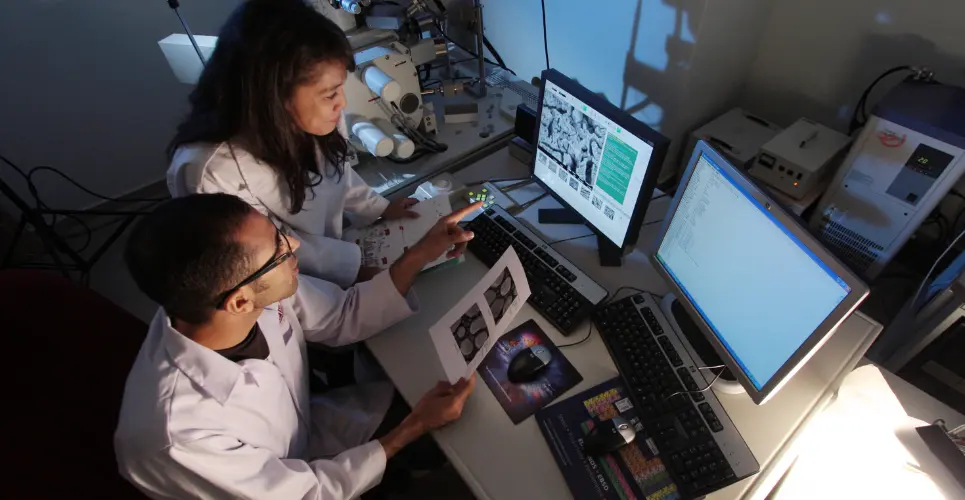
IT and Technology Work Experience
Getting hands-on experience can be extremely helpful in the tech industry. There are a lot of sub-sectors in this field, so try to find something that excites you.
- Work in a computer shop selling computers or doing repairs.
- Work at a technology company, such as the Cisco Pathway To Your Future Work Experience program.
- Shadow the IT department at your school.
- Work at a video game company to learn coding and digital art.
- Work on tech support or a help desk for a big company.
Journalism and Media Work Experience
Journalism and media are two more fields where work experience can be extremely helpful. In these roles, you will gain first-hand insight into the world of media.
- Work at a local newspaper.
- Work at a local blogging website.
- Work at a local radio station; you won’t be on air, but you’ll learn how the industry works.
- Work at a podcast studio.
- Work at a magazine in a field you’re interested in.
- Shadow employers at an editing house.
- Work on a TV set or at a production studio.
Law Work Experience
Getting work experience in the legal field can be tricky, because lawyers often deal with sensitive information. That said, it’s not impossible.
- Work at a law firm in the sector of your choice (e.g. corporate law, family law, criminal law)
- Observe courtroom proceedings.
- Work for a legal aid firm or non-profit organisation.
- Shadow a lawyer, paralegal, or legal assistant.
- Shadow a case manager to understand how legal cases unfold.
Find out more about our Law career summer programme
Marketing and Advertising Work Experience
Marketing is a great field to get work experience in, with plenty of jobs to go around. Try out the following ideas.
- Work at a marketing firm.
- Work at an advertising agency, either in the creative or analytics department.
- Work at a content marketing firm and learn how to write long-form content.
- Work at a PR company.
- Work in communications.
- Shadow a social media manager.
Find out more about our Marketing and Entertainment career summer programme
Photography and Film Work Experience
There aren’t a lot of ways to get work experience in photography other than working on your own projects and portfolios. That said, here are some ideas to get you started.
- Shadow a professional photographer.
- Assist on film sets.
- Work for a documentary filmmaker.
- Shadow a cinematographer.
- Work at a portrait gallery.
- Volunteer at a film festival.

Politics Work Experience
Making connections in the politics field can help you later down the line. As a result, work experience can be extremely helpful. Here are some ideas for political work experience.
- Work at your local council.
- Volunteer for a political campaign.
- Shadow a campaigner.
- Shadow a political journalist.
- Work for a think tank or poll taker.
Retail Work Experience
There are plenty of jobs available in retail. These roles can help you learn about sales, customer service, inventory management, merchandising, and more.
- Work at a High Street shop.
- Shadow a visual merchandiser.
- Work at an e-commerce retailer like ASOS or Boohoo.
- Shadow a retail manager
- Volunteer at pop-up shops or events.
Science and Research Work Experience
Not all research projects are open to year 10s. That said, there are still plenty of ways to explore the world of science and research.
- Work at a research centre as an assistant.
- Work at a laboratory, such as the National Physical Laboratory .
- Work at a science museum.
- Work at an astronomical observatory.
- Shadow a researcher or scientist.
Social Work and Community Outreach Work Experience
Social work can be a sensitive field, which means that not all avenues are open to year 10s. However, there are still plenty of opportunities to give you a taster of the work.
- Work at a charity shop to learn skills like communication, handling money, and more.
- Work at a food bank, such as the Trussel Trust .
- Work in a retirement home as an assistant.
- Volunteer for a charity like Age UK .
- Work at a community centre.
Software and Coding Work Experience
If you’re interested in coding, there is a wealth of opportunities to get involved with. Try out the following.
- Work at a software firm.
- Try the Softwire Year 10 Work Experience program.
- Work as a coding intern.
- Shadow a UX or UI designer.
- Work with the development team at a startup.
Sports Work Experience
There are plenty of ways to get involved with sport locally. Here are some ideas for work experience that will teach you about coaching, sports management, and more.
- Work at a gym.
- Work at a local sports club–there are various roles available, from gardener to physical therapist.
- Shadow a coach.
- Work at a golf course.
- Volunteer at a school sports club.
- Shadow a sports commentator.
- Volunteer at a sports shop.
- Volunteer at sporting events.
- Shadow a personal trainer.
- Create your own coaching plans and coach your friends or family.
- Shadow people at a sports media company.
- Volunteer as an umpire or referee.

Teaching and Childcare Work Experience
Sometimes, it’s challenging to find teaching and childcare roles while you’re still in school. Still, there are plenty of ways to find relevant experience.
- Work at a primary or secondary school to learn lesson planning.
- Work in a soft play area.
- Work at your current school and help your teachers, IT technicians, or maintenance staff.
- Become a childminder or babysitter.
- Volunteer at a youth club.
- Volunteer at a nursery or daycare centre, such as Pioneer Childcare .
- Shadow an ESL teacher.
- Tutor younger students in a subject you’re good at.
Veterinary Work Experience
The veterinary field is another one where relevant work experience can help you later down the line. There are lots of interesting ways to get involved with animal care, helping you to learn about veterinary procedures and treatments.
- Work at a dog home.
- Shadow at a vet clinic.
- Work at a cattery.
- Work on a farm.
- Work as a zookeeper’s assistant or work at a zoo (check out Chester Zoo’s volunteering page ).
- Become a local dog walker (this one might even let you make a bit of money!)
Vocational Work Experience
The opportunities for vocational work experience are endless. There are so many roles to suit a huge range of interests, so there’s guaranteed to be something for you.
- Work at a car garage.
- Work at a carpentry business.
- Shadow a plumber or an electrician.
- Work at a hairdresser’s or shadow a beautician.
Get Practical Work Experience with Immerse
The right work experience placement can be the key to shaping your future. It gives you a chance to explore different industries and gain crucial insights to make informed career decisions.
Check out our Career Insights programme to get hands-on work experience in a range of industries, featuring a residential stay in London, New York, or San Francisco.
Hopefully, these work experience ideas for year 10 students, give you a helpful start. It’s time to take a step toward your future and begin your career journey today.
Real Alumni Stories
Learn more about our alumni through their success stories.
- Real stories about our Alumni
- Students share their programme experiences
- Case studies from Alumni heading to Oxbridge
- Alumni insights and stats
Empower Your Child's Future: Book Your Complimentary Consultation Now
- Receive tailored advice to match your child's interests and goals.
- Gain insights from our experienced programme consultants.
- Get answers in real-time, making your decision-making process smoother and more informed.

Subscribe to the Immerse Education newsletter for £100 off your programme*
* Terms and Conditions may apply
Download Our Prospectus

- I'm a Parent
- I'm a Student
- First Name *
- Last Name *
- Which subjects interest you? (Optional) Architecture Artificial Intelligence Banking and Finance Biology Biotechnology Business Management Chemistry Coding Computer Science Computer Science and Artificial Intelligence Creative Writing Creative Writing and Film Criminology Data Science and Analytics Earth Science Economics Encryption and Cybersecurity Engineering English Literature Entrepreneurship Fashion and Design Female Future Leaders Film Studies Fine Arts Global Society and Sustainability Health and Biotechnology History International Relations Law Marketing and Entertainment Mathematics Medicine Medicine and Health Sciences Nanotechnology Natural Sciences Philosophy Philosophy Politics and Economics Physics Psychology Software Development and AI Software Development and Gaming Veterinary Studies Online Research Programme
Secure priority enrolment for our new summer school location with a small refundable deposit.
" * " indicates required fields
Receive priority enrolment for new summer school locations by registering your interest below.
Our programme consultant will contact you to talk about your options.
- Family Name *
- Phone Number
- Yes. See Privacy Policy.
Subject is unavailable at location
You have selected a subject that is not available at the location that you have previously chosen.
The location filter has been reset, and you are now able to search for all the courses where we offer the subject.

IMAGES
VIDEO
COMMENTS
List the employer — for example, the university or research department — job title, dates, and accomplishments, just like you would any other work experience. List research in your work experience section using action verbs, accomplishments, and metrics. More information: How to list your work experience on your resume.
Download our guide to work experience. Guide to work experience. pdf, size 271 kb. Speak to your careers adviser, chemistry or science teacher about local companies that might offer work experience. Your school may also have a work experience programme. Attending your school careers fairs or employer talks will help you learn about jobs that ...
The MRC London School of Medical Sciences offer laboratory-based research projects as well as a project in science communication. MRC Summer Students. If you are thinking about a career in healthcare, take a look at this guide to finding work experience in the NHS. Step into the NHS: work experience
How to put research on your resume. Follow these steps to add research skills to your resume: 1. Review the job description. Start by reviewing the job description closely and identifying whether the employer is looking for specific types of research skills. Make a list of all of the research-related skills they're looking for in a candidate. 2.
Work experience lets you see what a real working environment is like. You get to test out your skills in real-life situations. If you think you'd like to pursue a career in science, it's an excellent way to develop your abilities and makes a strong addition to your CV. And if you're not sure whether a science job is right for you, doing a ...
Just like the way your options can seem very limited when applying for your first job, asking for a research position when you have no "experience" can seem discouraging — maybe even to the point of causing you to question whether you should apply in the first place.
Here are the steps that you can follow to create an effective science CV: 1. Review the job posting. Before beginning your CV, you can review the job posting of the position for which you're applying. By doing this, you can better match your qualifications to the employer's educational requirements and preferred experience.
Virtual Work Experience. Partnering with Wellcome Connecting Science and Springpod, we bring you Virtual Work Experience. Designed for students aged 16 and above, this program allows participants to explore various careers in genomics, science, and data without leaving their homes. From laboratory roles to communication and management positions ...
Common Responsibilities Listed on Research Scientist Resumes: Conducting scientific research and experiments to explore new theories, concepts, and technologies. Designing and implementing research projects, including developing research protocols and methodologies. Collecting and analyzing data using various scientific techniques and tools.
Research Experience for Undergrads (REU) Research Experiences for Undergraduates (REU) are programs that give students the opportunity to actively participate in research funded by the National Science Foundation at host institution. Students work closely with researchers and faculty on a research project to gain new knowledge and build skills.
Research Scientist Resume Template. 1. Use the Right Research Scientist Resume Format. 2. Write a Science Research Resume Objective or Summary. 3. Go with Evidence-Based Job Descriptions and Skills. 4. Make Your All-Important Education Section Work for You.
The GOS ICH Work Experience Scheme aims to support school pupils in exploring career opportunities in Biomedical / Scientific Research Science. The scheme runs twice a year, in June/July and October, and provides a week-long programme of activities. We are committed to increasing the diversity and social mobility of our student population. We welcome applications from all students keen to ...
Our internships are designed to offer practical work experience and training to undergraduates and recent graduates. Successful applicants will work alongside experienced botanists, mycologists and conservation scientists to contribute to projects designed to achieve the goals set out in Kew's Science Strategy.. This could include contributing to ongoing botanical research, policy or ...
Many claim that undergraduate research experiences improve preparation of the next generation of scientists and increase persistence in science (1 - 3). The limited evidence for the impact of undergraduate research experiences makes it difficult, however, to justify the substantial resources they require.
Our work experience programme highlights the variety of careers available, from world-leading laboratory research to the supporting business services. Placements might be in research laboratories in areas such as cell biology, genetics, immunology and bioinformatics. Work experience could be also in non-laboratory locations such as the IT ...
Work Experience 2023-2024. All applications for work experience have now been filled for Spring and Summer 2024. Applicants may apply from October 2024 onwards. CSCI is committed to taking on work experience students, year 10 and above, to participate in a period of work experience. Students will have the opportunity to experience 'live ...
Work experience. The aim of work experience is to provide an experience of work, rather than just to try a particular job, though that can be included. The idea is that young people should have the opportunity to develop their transferable skills and, if possible, to put some of their science and maths skills into practice, or observe others ...
The LMB offers a variety of work experience placements for students in Years 10 to 13 (aged 14 and above). Our placements provide hands-on experience of working in an academic research institute. Placements may be within an LMB research group, scientific facility or support services, highlighting the variety of roles that underpin our cutting ...
STFC work experience programme. Daresbury Laboratory (DL), Rutherford Appleton Laboratory (RAL) and UK Astronomy Technology Centre (UK ATC) offer work experience placements to Year 10, 11, 12 and 13 students each year, many from local schools and around the country. As far as possible they are placed depending on the interests they indicate on ...
The national average salary for a science graduate is £25,000 a year. But this depends on your role, employer and location. The more experience you gain though, the more you'll earn through raises and promotions. As a senior biomedical scientist, you could take home £53,000 a year!
Virtual work experience Step into the shoes of a LifeArc team member and complete tasks that replicate the work that our biology research team does everyday. Duration: 4-6 hours Course information The virtual work experience programme is an excellent opportunity to see what the day-to-day workings of an industrial research scientist looks like. The lessons […]
Learn about 12 science careers that make a difference and how they compare in terms of educational requirements, outlooks, and salaries. ... chemistry, or physics for an entry-level job. A doctorate is required to do independent research or work in development. Median Annual Pay (2023): $107,460 Number of People Employed: 34,500 Projected Job ...
The virtual program enables Year 10 and Year 11 students to benefit from work experience no matter where they live, removing travel, geographic and cost constraints. Students participate using a secure online communication and collaboration platform while at school, home or a supported community venue, such as a library.
Our Careers Lab Work Experience Programme provides sixth form (Year 12 and Year 13) students with a week-long opportunity to explore various career paths within the Cancer Research UK Cambridge Institute. Aimed at those interested in gaining practical insights into different professional fields, the programme challenges preconceptions about working in science while aligning with our mission to ...
At the core of most summer research internships is a research project of your own. While working on it, you learn new scientific techniques and how to design experiments, analyze results, formulate hypotheses, and keep a lab notebook. In the best cases (but not always), you work closely with a supervisor who guides and inspires you. Advertisement.
Science and Research Work Experience. Not all research projects are open to year 10s. That said, there are still plenty of ways to explore the world of science and research. Work at a research centre as an assistant. Work at a laboratory, such as the National Physical Laboratory. Work at a science museum. Work at an astronomical observatory.